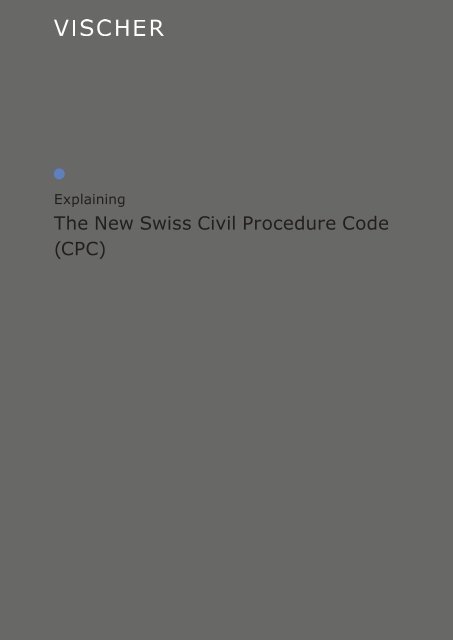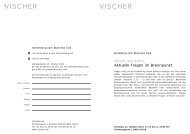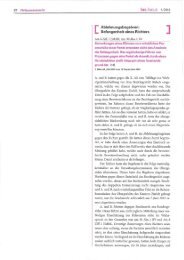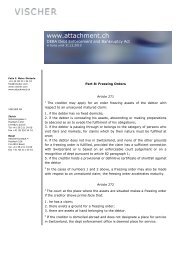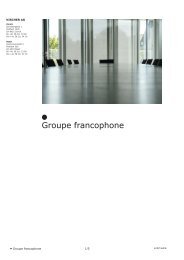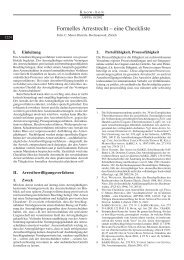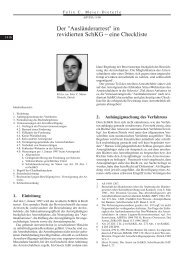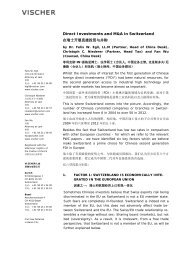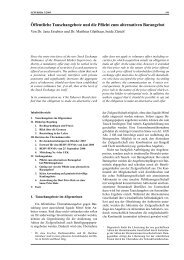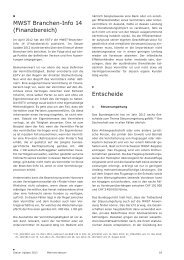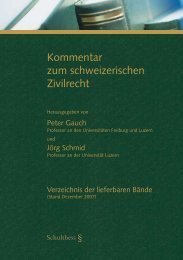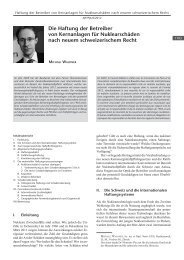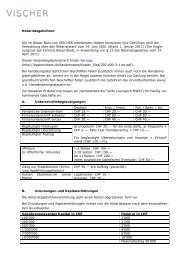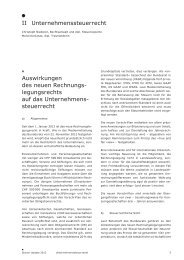The New Swiss Civil Procedure Code (CPC) - Vischer
The New Swiss Civil Procedure Code (CPC) - Vischer
The New Swiss Civil Procedure Code (CPC) - Vischer
Create successful ePaper yourself
Turn your PDF publications into a flip-book with our unique Google optimized e-Paper software.
Explaining<br />
<strong>The</strong> <strong>New</strong> <strong>Swiss</strong> <strong>Civil</strong> <strong>Procedure</strong> <strong>Code</strong><br />
(<strong>CPC</strong>)<br />
<br />
Interim Legal Protection in Corporate Practice XXX<br />
1
Explaining<br />
<strong>The</strong> <strong>New</strong> <strong>Swiss</strong> <strong>Civil</strong> <strong>Procedure</strong> <strong>Code</strong><br />
(<strong>CPC</strong>)<br />
March 2013<br />
© 2013 VISCHER Ltd.
Contents<br />
<br />
I Introduction 5<br />
<br />
II <strong>Procedure</strong> 6<br />
A Jurisdictions (art. 4–46 <strong>CPC</strong>) and court organization 6<br />
B Forum selection agreements (art. 17 <strong>CPC</strong>) 6<br />
C Forum-running 7<br />
D Initiation of action (art. 197–218 <strong>CPC</strong>) 8<br />
E Advance of costs/party compensation (art. 98–99 <strong>CPC</strong>) 9<br />
F Course of an ordinary financial dispute 9<br />
G Proceedings before the Zurich Commercial Court 11<br />
H Employment law proceedings 11<br />
I Tenancy law proceedings 11<br />
J Third-party claim (art. 81 et seq. <strong>CPC</strong>) 12<br />
K Remedy in clear cases (art. 257 <strong>CPC</strong>) 12<br />
L Non-extendable deadlines 13<br />
M Interruption of limitation periods (art. 135 et seq. CO) 14<br />
N Protective letter (art. 270 <strong>CPC</strong>) 14<br />
O Cantonal appellate remedies (art. 308–334 <strong>CPC</strong>) 14<br />
P Transitional provisions (art. 404–407 <strong>CPC</strong>) 15<br />
<br />
<strong>The</strong> <strong>New</strong> <strong>Swiss</strong> <strong>Civil</strong> <strong>Procedure</strong> <strong>Code</strong> (<strong>CPC</strong>) Contents
III Evidence 16<br />
A Numerus clausus of admissible evidence (art. 168(1) <strong>CPC</strong>) 16<br />
B Testimony (art. 169–176 <strong>CPC</strong>) 16<br />
C Physical records (art. 177–180 <strong>CPC</strong>) 16<br />
D Expert opinion (art. 183–189 <strong>CPC</strong>) 17<br />
E Questioning and deposition of the parties (art. 191–193 <strong>CPC</strong>) 17<br />
F <strong>Procedure</strong> for taking evidence (art. 150–193 <strong>CPC</strong>) 17<br />
G Cautionary taking of evidence (art. 158 <strong>CPC</strong>) 18<br />
H <strong>New</strong> facts and evidence (art. 229 <strong>CPC</strong>) 18<br />
I Duty to cooperate and right to refuse (art. 160–167 <strong>CPC</strong>) 19<br />
<br />
IV Enforcement 20<br />
A Enforcement of decisions (art. 335–346 <strong>CPC</strong>) 20<br />
B Attachment (art. 271–281 DCBA) 21<br />
C Enforceable official record (art. 347–352 <strong>CPC</strong>) 22<br />
<br />
V Domestic Arbitration 23<br />
<br />
VI Bibliography 25<br />
<br />
Contacts 26<br />
<br />
<strong>The</strong> <strong>New</strong> <strong>Swiss</strong> <strong>Civil</strong> <strong>Procedure</strong> <strong>Code</strong> (<strong>CPC</strong>) Contents
I Introduction<br />
1 On January 1, 2011 the new <strong>Swiss</strong> <strong>Civil</strong> <strong>Procedure</strong><br />
<strong>Code</strong> (<strong>CPC</strong>) entered into force and replaced the 26<br />
different cantonal (state) codes of civil procedure.<br />
<strong>The</strong> <strong>CPC</strong> is an amalgamation of the 26 pre-existing<br />
cantonal codes and regulates all issues of civil<br />
proce dure in domestic cases initiated before the<br />
cantonal courts on or after January 1, 2011.<br />
2 <strong>The</strong> new unified civil procedural law ensures that<br />
the substantive federal law is applied uniformly<br />
throughout Switzerland and thus marks a major<br />
milestone in the civil procedure landscape of Swit-<br />
zerland.<br />
3 <strong>The</strong> <strong>CPC</strong> has significantly amended certain proce-<br />
dural topics previously contained in the individual<br />
cantonal rules. <strong>The</strong> aim of this paper is to briefly<br />
introduce the <strong>CPC</strong> and to highlight the most impor-<br />
tant changes.<br />
<br />
<strong>The</strong> <strong>New</strong> <strong>Swiss</strong> <strong>Civil</strong> <strong>Procedure</strong> <strong>Code</strong> (<strong>CPC</strong>) Introduction<br />
5
II <strong>Procedure</strong><br />
A<br />
Jurisdictions<br />
(art. 4–46 <strong>CPC</strong>) and<br />
court organization<br />
4 <strong>The</strong> territorial jurisdiction in domestic civil pro-<br />
ceedings before cantonal authorities is now speci-<br />
fied in art. 9–46 <strong>CPC</strong>. <strong>The</strong> Federal Act on Jurisdic-<br />
tion in <strong>Civil</strong> Matters (Gerichtsstandsgesetz, GestG)<br />
has been abolished. 1<br />
5 Art. 9–46 <strong>CPC</strong> coincide to a large extent with the<br />
provisions of the GestG. 2 <strong>The</strong> <strong>CPC</strong>, however, also<br />
establishes new forums, such as, for example, a<br />
fo rum at the place of the characteristic perfor-<br />
mance of a contract (art. 31 <strong>CPC</strong>), 3 a forum which<br />
was already well known in the Euro-international<br />
context. 4 A forum can be inferred, if none is man-<br />
datory or partially mandatory in the <strong>CPC</strong> (art. 9<br />
<strong>CPC</strong>). Accordingly, the new forum does not apply to<br />
all contracts, e.g., not to em ploy ment contracts,<br />
leases, or consumer contracts. 5<br />
6 To a large extent the court organization still rests<br />
with the cantons which had to adapt their respec-<br />
tive legislation to the <strong>CPC</strong>. For example, the Zurich<br />
Court Compo sition Act (Gerichtsverfassungsgesetz<br />
ZH, GVG ZH) was replaced by the Zurich Court<br />
Organization Act (Gerichtsorganisationsgesetz ZH,<br />
GOG ZH). 6<br />
In collaboration with Nicole Brauchli-Jageneau, M.A. HSG in Law<br />
& Economics, and Giannina Spescha, MLaw.<br />
1 Addendum I, Title 1 <strong>CPC</strong> (abrogation of previous law).<br />
2 Sutter-Somm/Klingler in Sutter-Somm/Hasenböhler/Leuen-<br />
berger, N 1 to art. 9 <strong>CPC</strong>.<br />
3 Leuenberger/Uffer-Tobler, Schweizerisches Zivilprozessrecht,<br />
p. 34 et seq.<br />
4 Spühler/Dolge/Gehri, p. 43.<br />
5 Haas/Strub in Oberhammer, N 3 to art. 31 <strong>CPC</strong>.<br />
6 Gesetz über die Gerichts- und Behördenorganisation im Zivil-<br />
und Strafprozess vom 10. Mai 2011, (GOG ZH; ON 211.1); cf.<br />
<br />
<strong>The</strong> <strong>New</strong> <strong>Swiss</strong> <strong>Civil</strong> <strong>Procedure</strong> <strong>Code</strong> (<strong>CPC</strong>) <strong>Procedure</strong><br />
B<br />
Forum selection<br />
agreements<br />
(art. 17 <strong>CPC</strong>)<br />
7 <strong>The</strong> prerequisites for the validity of a forum selec-<br />
tion have not changed substantially, neither in form<br />
nor content, from those under the old GestG. 7<br />
Under art. 17(1) <strong>CPC</strong>, a stipulation of forum is per-<br />
missible provided that no mandatory or partially<br />
mandatory forums have to be observed. 8 <strong>The</strong> stipu-<br />
lation must be made in writing or in another form<br />
that allows it to be evidenced by text. <strong>The</strong> previous<br />
enumeration of examples in the GestG – “telex,<br />
fax, e-mail,” etc., is not included in art. 17 <strong>CPC</strong>, but<br />
those forms remain permissible. 9<br />
8 Whether an oral agreement with subsequent writ-<br />
ten confirmation still satisfies the validity require-<br />
ment, is disputed. 10 A mere oral agreement re-<br />
mains insufficient, even in commercial transac-<br />
tions 11 (but see art. 23(1) (a) to (c) of the Lugano<br />
Convention (LugC), under which forum require-<br />
ments in international trade were largely abol-<br />
ished). 12<br />
9 Forum selection provisions in pre-formulated con-<br />
tracts (form contracts) remain permissible under<br />
the <strong>CPC</strong> as long as such pre-formulated terms have<br />
Leuenberger/Uffer-Tobler, Schweizerisches Zivilprozess recht,<br />
p. 19 et seq.<br />
7 Sutter-Somm/Hedinger in Sutter-Somm/Hasenböhler/Leuenberger,<br />
N 1 to art. 17 <strong>CPC</strong>; Gasser/Rickli, N 1 to art. 17 <strong>CPC</strong>.<br />
8 Haas/Schlumpf in Oberhammer, N 9 to art. 17 <strong>CPC</strong>.<br />
9 Sutter-Somm/Hedinger in Sutter-Somm/Hasenböhler/Leuenberger,<br />
N 6 to art. 17 <strong>CPC</strong>; Berger in Güngerich I, N 34 et seq.<br />
to art. 17 <strong>CPC</strong>.<br />
10 Courvoiser in Baker & McKenzie, N 17 to art. 17 <strong>CPC</strong>; Meier,<br />
Schweizerisches Zivilprozessrecht, p. 116; Haas/Schlumpf in<br />
Oberhammer, N 18 to art. 17 <strong>CPC</strong>.<br />
11 Courvoisier in Baker & McKenzie, N 17 to art. 17 <strong>CPC</strong>.<br />
12 Berger in Oetiker/Weibel, N 48 to art. 23 LugC.<br />
6
een validly incorporated into the contract. For<br />
example, a reference in the main contract to the<br />
general terms of business is sufficient. 13<br />
10 What is new under the <strong>CPC</strong> is, that the elected<br />
forum no longer has the right to deny jurisdiction<br />
on the grounds that the dispute has insufficient<br />
connection to the forum. Under art. 17 <strong>CPC</strong>, a valid<br />
forum selection agreement is binding on the court<br />
of con ferred jurisdiction. 14 As a consequence, <strong>Swiss</strong><br />
litigants are free to agree on a specific place of<br />
jurisdiction within Switzerland, even if the place has<br />
no connection whatso ever with the domicile/seat of<br />
the parties or the obligations under the contract.<br />
11 While the place of jurisdiction can be freely chosen,<br />
the same does not apply with regard to subject<br />
matter competence which is, under the <strong>CPC</strong>, out-<br />
side the parties’ disposition. 15 Under some previous<br />
cantonal codes of procedure, jurisdiction could be<br />
conferred on the higher courts. 16 However, now<br />
under art. 8 <strong>CPC</strong>, conferral of jurisdic tion on the<br />
higher cantonal court is permissible only in the<br />
case of financial disputes with disputed values of at<br />
least CHF 100,000. In addition, a forum selection<br />
may also be made under the <strong>CPC</strong> in cases for which<br />
legislation has specified that spe cial courts have<br />
subject matter jurisdiction (e.g., with employment<br />
law disputes). Apart from these options, the parties<br />
cannot provide for a specific court. 17 Two natu ral<br />
persons can, therefore, for example, not validly<br />
agree to submit their dispute to the Zurich Com-<br />
mercial Court. 18<br />
12 Intertemporal aspects also need to be taken into<br />
account when considering the valid ity and effects<br />
of forum selection agreements. <strong>The</strong> validity of<br />
forum selections that were agreed to before the<br />
<strong>CPC</strong> came into effect is judged under the law that<br />
was in force when the agreement was concluded<br />
(art. 406 <strong>CPC</strong>). 19 In forum selection agree ments, a<br />
distinction must be made between these time peri-<br />
ods with respect to valid ity:<br />
– Forum selection agreements under the new<br />
law, i.e., ones that were stipulated after<br />
January 1, 2011, fall under the regime of the<br />
<strong>CPC</strong>. 20<br />
13 Sutter-Somm/Hedinger in Sutter-Somm/Hasenböhler/Leuen-<br />
berger, N 22 to art. 17 <strong>CPC</strong>.<br />
14 Haas/Schlumpf in Oberhammer, N 24 to art. 17 <strong>CPC</strong>;<br />
Botschaft, p. 7264.<br />
15 Leuenberger/Uffer-Tobler, Schweizerisches Zivilprozessrecht,<br />
p. 61.<br />
16 Schwander, p. 74 et seq.<br />
17 Spühler/Dolge/Gehri, p. 62.<br />
18 Schwander, p. 73 et seq.<br />
19 Fischer in Baker & McKenzie, N 2 to art. 406 <strong>CPC</strong>.<br />
20 Sutter-Somm/Hedinger in Sutter-Somm/Hasenböhler/Leuen-<br />
berger, N 6 et seq. to art. 406 <strong>CPC</strong>.<br />
<br />
<strong>The</strong> <strong>New</strong> <strong>Swiss</strong> <strong>Civil</strong> <strong>Procedure</strong> <strong>Code</strong> (<strong>CPC</strong>) <strong>Procedure</strong><br />
– <strong>The</strong> validity of forum selection agreements<br />
made under the old law is reviewed either<br />
– according to the GestG, if they were<br />
stipulated between January 1, 2001<br />
and December 31, 2010, or<br />
– according to the cantonal law of civil<br />
procedure if they were made before<br />
the GestG entered into force, i.e., pri-<br />
or to January 1, 2001 (art. 39 GestG;<br />
in this case, however, it is necessary<br />
to observe the case law of the <strong>Swiss</strong><br />
Federal Tribunal, under which a forum<br />
selection under the old law remains<br />
valid only until a contract adjustment<br />
has taken place, which includes the<br />
provision of new general terms of<br />
business). 21<br />
13 <strong>The</strong> effects of forum selection agreements are ex-<br />
clusively governed by the <strong>CPC</strong> (art. 404(2) <strong>CPC</strong>).<br />
Thus, the right of refusal provided in art. 9(3)<br />
GestG no longer applies and the court of conferred<br />
jurisdiction has jurisdiction without exception. 22<br />
14 Finally, it is to be noted that forum selection agree-<br />
ments unfavorable to consumers are not permitted<br />
(art. 35(1)(a) <strong>CPC</strong>). This means that a consumer will<br />
be entitled to file a claim at his domicile in spite of<br />
the existence of a forum selection agreement pro-<br />
viding for a forum at the place of business of the<br />
supplier (art. 32(1)(a) <strong>CPC</strong>). 23<br />
C<br />
Forum-running<br />
15 <strong>The</strong> previous cantonal codes of procedure provided<br />
for different rules concerning pen dency of a claim.<br />
In certain cases, this allowed for so called forum-<br />
running, i.e., the parties’ race to attain the pre-<br />
ferred forum. 24<br />
16 Art. 62(1) <strong>CPC</strong> now contains a uniform rule regard-<br />
ing lis pendens. It provides that pendency begins<br />
with the filing of a request for conciliation, a claim,<br />
a motion, or a joint request for divorce. With pen-<br />
dency, the procedural effects of blockage (art. 64(1)<br />
(a) <strong>CPC</strong>) and the fixing of the forum (perpetuatio<br />
fori, art. 64(1)(b) <strong>CPC</strong>) are established. <strong>The</strong> filing<br />
date of a request for conciliation or a claim is de-<br />
21 BGE 132 III 268, p. 271; Meier, Schweizerisches Zivilprozess-<br />
recht, p. 118.<br />
22 Courvoisier in Baker & McKenzie, N 25 to art. 17 <strong>CPC</strong>.<br />
23 Walther in Güngerich I, N 1 et seq. to art. 35 <strong>CPC</strong>.<br />
24 Müller-Chen in Brunner/Gasser/Schwander, N 1 et. seq. to<br />
art. 62 <strong>CPC</strong>.<br />
7
fined as the mailing date, i.e., the date of post-<br />
mark. 25<br />
17 Due to this new uniform regulation on pendency,<br />
forum running in the <strong>Swiss</strong> domes tic context will<br />
lose importance. 26 In contrast, the question of fo-<br />
rum running may become more important, and fa-<br />
vor the <strong>Swiss</strong> courts, in the Euro-international<br />
context. <strong>The</strong> revised LugC entered into force simul-<br />
taneously with the <strong>CPC</strong>. In art. 30(1) LugC, the<br />
convention now states that the respective national<br />
law is no longer determinative for the beginning of<br />
pendency; the submission of the document insti-<br />
tuting the pro ceedings is now uniformly recognized<br />
as the commencement date. According to the LugC<br />
dispatch (Botschaft), the submission of a request<br />
for conciliation pursuant to art. 202 <strong>CPC</strong> qualifies<br />
as a document instituting proceedings. <strong>The</strong> concili-<br />
ation request, there fore, causes pendency within<br />
the meaning of art. 30(1) LugC. Accordingly, pen-<br />
dency in Switzerland now occurs at a very early<br />
stage, without the need to work out full reasoning<br />
for the claim and without the burden of continua-<br />
tion being established. 27<br />
D<br />
Initiation of action<br />
(art. 197–218 <strong>CPC</strong>)<br />
18 As a general rule litigation is to be preceded by a<br />
conciliation attempt before a concilia tion authority<br />
(art. 197 <strong>CPC</strong>). This rule applies to all civil cases in<br />
ordinary and simplified proceedings, which, thus,<br />
includes for example cases under employ ment law<br />
and those in which the defendant has his seat in a<br />
LugC country. 28<br />
19 What is new under the <strong>CPC</strong> is that conciliation may<br />
be substituted with mediation. Media tion must be<br />
requested either in the request for conciliation or at<br />
the concilia tion hearing (art. 213(2) <strong>CPC</strong>). 29<br />
25 Sutter-Somm/Hedinger in Sutter-Somm/Hasenböhler/Leuenberger,<br />
N 9 to art. 62 <strong>CPC</strong>; Schleiffer Marais in Baker &<br />
McKenzie, N 4 to art. 62 <strong>CPC</strong>.<br />
26 Botschaft, p. 7277; Schleiffer Marais in Baker & McKenzie,<br />
N 7 to art. 62 <strong>CPC</strong>.<br />
27 Schleiffer Marais in Baker & McKenzie, N 12 et seq. to art. 62<br />
<strong>CPC</strong>.<br />
28 Gloor/Umbricht in Oberhammer, N 1 et seq. to art. 197 <strong>CPC</strong>.<br />
29 Ruggle in Spühler/Tenchio/Infanger, N 1 et seq. to art. 213<br />
<strong>CPC</strong>.<br />
<br />
<strong>The</strong> <strong>New</strong> <strong>Swiss</strong> <strong>Civil</strong> <strong>Procedure</strong> <strong>Code</strong> (<strong>CPC</strong>) <strong>Procedure</strong><br />
20 <strong>The</strong> conciliation attempt is essentially mandatory.<br />
Art. 198 <strong>CPC</strong> gives an exhaustive list of the (rela-<br />
tively narrow) exceptions. 30 Of significance here is<br />
that<br />
– conciliation proceedings are not held if a<br />
commercial court is competent (art. 198(f)<br />
in conjunction with art. 6 <strong>CPC</strong>),<br />
– in financial disputes with a value in dispute of<br />
at least CHF 100,000, the parties may mutu-<br />
ally agree to renounce the conciliation pro-<br />
ceedings (art. 199(1) <strong>CPC</strong>),<br />
– the plaintiff may unilaterally renounce con-<br />
ciliation if the defendant’s seat or domicile is<br />
abroad (art. 199(2)(a) <strong>CPC</strong>), and<br />
– if all the parties so request, the conciliation<br />
proceedings are replaced by media tion<br />
(art. 213 <strong>CPC</strong>).<br />
21 <strong>The</strong> request for conciliation triggers pendency<br />
(art. 62 <strong>CPC</strong>). However, the burden of continuation<br />
takes effect only when the statement of claim is<br />
served on the defend ant (art. 65 <strong>CPC</strong>). 31<br />
22 Under the <strong>CPC</strong>, the competence of the conciliation<br />
authority has been increased. At the plaintiff’s re-<br />
quest, the conciliation authority may render deci-<br />
sions in financial dis putes with a value in dispute of<br />
up to CHF 2,000 (art. 212 <strong>CPC</strong>). 32<br />
23 If the parties do not reach an agreement in the<br />
conciliation attempt, the conciliation authority is-<br />
sues an authorization to proceed (art. 209(1) and<br />
(2) <strong>CPC</strong>). Usually the plaintiff must file the state-<br />
ment of claim within three months of receipt of the<br />
authorization to proceed (art. 209(3) <strong>CPC</strong>). Shorter<br />
deadlines can apply, for example in disputes con-<br />
cerning the lease of residential and business prop-<br />
erty (art. 209(4) <strong>CPC</strong>). 33 Whether the respective<br />
time limit is suspended during court holi days was<br />
disputed, 34 until the <strong>Swiss</strong> Federal Tribunal recently<br />
settled the issue with its ruling in favor of suspen-<br />
sion. 35<br />
30 Infanger in Spühler/Tenchio/Infanger, N 1 to art. 198 <strong>CPC</strong>.<br />
31 Sutter-Somm/Hedinger in Sutter-Somm/Hasenböhler/Leuen-<br />
berger, N 13 to art. 65 <strong>CPC</strong>.<br />
32 Infanger in Spühler/Tenchio/Infanger, N 1 et seq. to art. 210<br />
<strong>CPC</strong> and N 1 et seq. to art. 211 <strong>CPC</strong>.<br />
33 Alvarez/Peter in Spühler/Tenchio/Infanger, N 3 and 9 et seq.<br />
to art. 209 <strong>CPC</strong>.<br />
34 In favour of the application of the court holidays: Infanger in<br />
Spühler/Tenchio/Infanger, N 25 to art. 209 <strong>CPC</strong>; Gasser/Rickli,<br />
N 5 to art. 209 <strong>CPC</strong>; against: Honegger in Sutter-Somm/<br />
Hasenböhler/Leuenberger, N 10 to art. 209 <strong>CPC</strong> (edition 2010).<br />
35 Decision of the <strong>Swiss</strong> Federal Tribunal 4A_391/2012, Septem-<br />
ber 20, 2012, consid. 2.4.<br />
8
E<br />
Advance of costs/<br />
party compensation<br />
(art. 98–99 <strong>CPC</strong>)<br />
24 Contrary to some of the previous cantonal proce-<br />
dure codes, the <strong>CPC</strong> provides for a general duty to<br />
advance court fees (art. 98 <strong>CPC</strong>). Although the pro-<br />
vision is worded as a discretionary clause, there is<br />
a clear tendency towards it becoming the general<br />
rule. 36<br />
25 <strong>The</strong>re is also a duty to pay advances in the case of<br />
counterclaims and when decisions are challenged. 37<br />
26 <strong>The</strong> plaintiff not only has to advance the court fees,<br />
but must also bear the collection risk. 38 <strong>The</strong> court<br />
draws the court fees from the advance. <strong>The</strong> party<br />
against whom costs are awarded must reimburse<br />
the other party for the advances paid (art. 111<br />
<strong>CPC</strong>).<br />
27 Security for party costs continues to be provided<br />
only upon request and in the pres ence of special<br />
reasons for security. Certain proceedings are ex-<br />
empted from the duty to secure party costs (art. 99<br />
<strong>CPC</strong>). 39<br />
28 <strong>The</strong> new duty to advance court fees has made liti-<br />
gation in Switzerland more cumber some. 40<br />
F<br />
Course of an ordinary<br />
financial dispute<br />
29 <strong>The</strong> provisions pertaining to ordinary proceedings<br />
(art. 291 et seq. <strong>CPC</strong>) give the courts a relatively<br />
large degree of latitude in structuring the course of<br />
the proceed ings. 41 <strong>The</strong> parties can exert influence<br />
on the course of the proceedings as well, e.g. by<br />
renouncing to a main hearing (art. 233 <strong>CPC</strong>). A sec-<br />
ond round of written briefs takes place only if the<br />
circumstances so require (art. 225 <strong>CPC</strong>) and many<br />
scholars are in favor of this remaining an excep-<br />
36 Suter/von Holzen in Sutter-Somm/Hasenböhler/Leuenberger,<br />
N 10 to art. 98 <strong>CPC</strong>; Botschaft, p. 7293; Meier, Schweizerisches<br />
Zivilprozessrecht, p. 421.<br />
37 Botschaft, p. 7293.<br />
38 Meier, Schweizerisches Zivilprozessrecht, p. 421.<br />
39 Rüegg in Spühler/Tenchio/Infanger, N 1 et seq. to art. 99 <strong>CPC</strong>.<br />
40 Rüegg in Spühler/Tenchio/Infanger, N 1 to art. 98 <strong>CPC</strong>.<br />
41 Gasser/Rickli, N 1 to art. 219 <strong>CPC</strong>.<br />
<br />
<strong>The</strong> <strong>New</strong> <strong>Swiss</strong> <strong>Civil</strong> <strong>Procedure</strong> <strong>Code</strong> (<strong>CPC</strong>) <strong>Procedure</strong><br />
tion. In a typical commercial case, though, it can be<br />
expected that, as per previous practice, a second<br />
exchange of briefs will take place. 42<br />
30 <strong>The</strong> court may, at any time, conduct an organiza-<br />
tional hearing (also referred to as “instruction<br />
hearing”) which is a new institution under the <strong>CPC</strong>.<br />
Under the scope of such hearings are informal dis-<br />
cussions of the matter in dispute, supplementation<br />
of the facts, an attempt at a settlement, prepara-<br />
tion for the main hearing, and the taking of evi-<br />
dence (art. 226 <strong>CPC</strong>). 43<br />
31 <strong>The</strong> main hearing consists of the first pleadings,<br />
the taking of evidence (if not already done) and the<br />
closing arguments. In the closing arguments, the<br />
merits of the case and the result of the evidence<br />
are discussed (art. 228–232 <strong>CPC</strong>). <strong>The</strong> parties may<br />
mutually dispense with the complete main hearing<br />
(art. 233 <strong>CPC</strong>) or merely the oral closing arguments<br />
in favor of written pleadings (art. 232(2) <strong>CPC</strong>). 44<br />
32 <strong>The</strong> court can provide notification of its decision<br />
with or without a written statement of the grounds<br />
(art. 238 and 239 <strong>CPC</strong>). In the latter case, either<br />
party may request such a written statement of the<br />
grounds within ten days. In order to be able to chal-<br />
lenge the decision by appeal or objection the par-<br />
ties must have received a written statement of the<br />
grounds (art. 239(2) <strong>CPC</strong>). 45<br />
33 <strong>The</strong> deadlines for the appeal, answer to appeal,<br />
objection (Beschwerde), and answer to objection<br />
are statutory deadlines and may not be extended<br />
(art. 144(1) <strong>CPC</strong>). 46<br />
34 <strong>The</strong> following diagram shows the usual course of an<br />
ordinary financial dispute (with variants):<br />
42 Botschaft, p. 7340; Frei/Willisegger in Spühler/Tenchio/<br />
Infanger, N 1 to art. 225 <strong>CPC</strong>; Leuenberger in Sutter-Somm/<br />
Hasenböhler/Leuenberger, N 7 to art. 225 <strong>CPC</strong>.<br />
43 Killias in Güngerich II, N 1 et seq. to art. 226 <strong>CPC</strong>.<br />
44 For a specific illustration of the course of an ordinary case:<br />
Meier, Schweizerisches Zivilprozessrecht, p. 341 et seq.<br />
45 Staehelin in Sutter-Somm/Hasenböhler/Leuenberger, N 30 to<br />
art. 239 <strong>CPC</strong>.<br />
46 Benn in Spühler/Tenchio/Infanger, N 1 to art. 144 <strong>CPC</strong>.<br />
9
Request for conciliation<br />
Reply<br />
Rejoinder<br />
Renunciation of main hearing<br />
Reply<br />
Rejoinder<br />
Hearing<br />
Authorization to proceed<br />
Deadline<br />
Mediation<br />
Claim<br />
Answer<br />
No second exchange of<br />
written briefs<br />
Main hearing<br />
Judgment<br />
Judgment<br />
<br />
<strong>The</strong> <strong>New</strong> <strong>Swiss</strong> <strong>Civil</strong> <strong>Procedure</strong> <strong>Code</strong> (<strong>CPC</strong>) <strong>Procedure</strong><br />
Hearing of instruction<br />
Rejoinder<br />
Renunciation of closing<br />
arguments<br />
Written pleadings<br />
With written reasons Without written reasons<br />
Appeal<br />
Deadline<br />
Answer to appeal<br />
Deadline<br />
No conciliation/renunciation<br />
if permissible<br />
Reply<br />
Request for written reasons<br />
Deadline<br />
Hearing Decision on the basis of the file<br />
10
G<br />
Proceedings before<br />
the Zurich Commercial<br />
Court<br />
35 It is to be noted that in proceedings before the<br />
(Zurich) Commercial Court, there are no concilia-<br />
tion proceedings (art. 198(f) <strong>CPC</strong>). If the Zurich<br />
Commercial Court has jurisdiction, a fully formu-<br />
lated statement of claim must be filed to initiate an<br />
action. For defendants with foreign domicile, this is<br />
often the only possibility to interrupt the limitation<br />
period under <strong>Swiss</strong> law (i.e., art. 135 <strong>Code</strong> of Obli-<br />
gations; CO).<br />
36 <strong>The</strong> <strong>CPC</strong> contains a uniform definition of “commer-<br />
cial dispute”. It makes a distinction between “com-<br />
mercial” in the narrow sense (art. 6(2) <strong>CPC</strong>) and<br />
“commercial” in the broad sense (art. 6(4) <strong>CPC</strong>).<br />
While the Commercial Court is always competent in<br />
the commercial disputes in the narrow sense, it<br />
only has jurisdiction on commercial dis putes in the<br />
broad sense if the cantonal law so provides (art. 6(4)<br />
<strong>CPC</strong>). 47<br />
37 A dispute is classified as commercial in the narrow<br />
sense, if it concerns the commer cial activity of at<br />
least one party, the parties are registered in the<br />
<strong>Swiss</strong> or an equiv alent foreign commercial registry<br />
and, usually, if the value in dispute exceeds<br />
CHF 30,000 (art. 6(2) <strong>CPC</strong>). 48<br />
38 If only the defendant is registered in the commer-<br />
cial registry, but the commercial activ ity of a party<br />
is affected and the value in dispute is at least<br />
CHF 30,000, the plaintiff can choose between the<br />
ordinary court and the commercial court (art. 6(3)<br />
<strong>CPC</strong>). It must be mentioned that the interpretation<br />
of this provision is disputed. It could be interpreted<br />
as meaning that the Commercial Court is to decide<br />
consumer disputes as well but some judges of the<br />
Zurich Commercial Court reject such an interpreta-<br />
tion. 49<br />
39 If a dispute is not “commercial”, no forum selection<br />
in favor of the Commercial Court or acceptance by<br />
appearance is possible. Accordingly, caution must<br />
be exercised when deciding on forum selection<br />
clauses with the designation “commercial court”.<br />
Such selection will, for example, usually be ineffec-<br />
47 Staehelin/Staehelin/Grolimund, N 8a to § 6.<br />
48 Berger in Güngerich I, N 6 et seq. to art. 6.<br />
49 Brunner in Brunner/Gasser/Schwander, N 23 et. seq. to art. 6<br />
<strong>CPC</strong>.<br />
<br />
<strong>The</strong> <strong>New</strong> <strong>Swiss</strong> <strong>Civil</strong> <strong>Procedure</strong> <strong>Code</strong> (<strong>CPC</strong>) <strong>Procedure</strong><br />
tive as against private (i.e., non-corporate) defen-<br />
dants. 50<br />
40 Under the <strong>CPC</strong>, the Commercial Court is now com-<br />
petent to order interim measures before the main<br />
case is pending (art. 6(5) <strong>CPC</strong>). 51<br />
H<br />
Employment law<br />
proceedings<br />
41 Art. 343 CO previously contained procedural provi-<br />
sions regarding employment dis putes. <strong>The</strong> regula-<br />
tion has been deleted with the entry into force of<br />
the <strong>CPC</strong>. 52<br />
42 <strong>New</strong> “simplified proceedings” apply where the val-<br />
ue in dispute does not exceed CHF 30,000 (instead<br />
of previous “simple and quick proceedings”), no<br />
court fees are payable (art. 113(2)(d) <strong>CPC</strong>) and new<br />
facts and evidence are permissible until the court’s<br />
deliberation phase (ex-officio establishment of<br />
facts, art. 247(2) and 229(3) <strong>CPC</strong>).<br />
43 It is to be noted that conciliation proceedings are<br />
mandatory (art. 197 et seq. <strong>CPC</strong>).<br />
I<br />
Tenancy law<br />
proceedings<br />
44 <strong>The</strong> joint conciliation authority (Mietschlichtungs-<br />
stelle) is competent only with respect to residential<br />
and business properties (art. 200(1) <strong>CPC</strong>). For<br />
other tenancy and lease agreements, the regular<br />
conciliation authority has jurisdiction. In these lat-<br />
ter cases, there is no exemption from costs before<br />
the conciliation authority (art. 113 <strong>CPC</strong>). 53<br />
45 <strong>The</strong> time limit for submission of the statement of<br />
claim after receipt of the authoriza tion to proceed<br />
is 30 days (instead of three months, art. 209(4)<br />
<strong>CPC</strong>). <strong>The</strong> deadline is suspended during court holi-<br />
days. 54<br />
50 Vock in Spühler/Tenchio/Infanger, N 15 to art. 6 <strong>CPC</strong>.<br />
51 Vock in Spühler/Tenchio/Infanger, N 17 to art. 6 <strong>CPC</strong>.<br />
52 Addendum I, Title 2 <strong>CPC</strong> (alteration of previous law).<br />
53 Disputed, Honegger in Sutter-Somm/Hasenböhler/Leuen-<br />
berger, N 4 to art. 200 <strong>CPC</strong>.<br />
54 Infanger in Spühler/Tenchio/Infanger, N 25 to art. 209 <strong>CPC</strong>;<br />
cf. para. 23.<br />
11
46 <strong>The</strong> conciliation authorities may submit a proposed<br />
judgment in cases of termination and extension,<br />
deposit of rent, and abusive rent (art. 210(1)(b)<br />
<strong>CPC</strong>). <strong>The</strong> time limit for the rejection of the pro-<br />
posed judgment is 20 days (previously 30 days, art.<br />
211(1) <strong>CPC</strong>) and is not suspended during court<br />
holidays (art. 145(2)(a) <strong>CPC</strong>). 55 Upon receiving the<br />
rejection, the conciliation authority shall grant the<br />
authorization to pro ceed and the statement of<br />
claim must be filed within 30 days. Otherwise the<br />
propo sition of judgment becomes binding (with res<br />
iudicata effect) (art. 211(3) <strong>CPC</strong>). 56<br />
47 Under the old law, no court costs were imposed and<br />
no party costs were awarded in tenancy concilia-<br />
tion proceedings. With the proposed judgment<br />
(art. 210(1)(b) <strong>CPC</strong>), this is no longer clear. Opin-<br />
ions differ as to whether the general rule on court<br />
costs applies in the case of a proposed judgment<br />
(art. 104 et seq. <strong>CPC</strong>). 57<br />
48 Proceedings under tenancy law are generally sim-<br />
plified proceedings (except for claims, e.g., dam-<br />
ages or claims for rent in which the value in dispute<br />
exceeds CHF 30,000; art. 243(2)(c) <strong>CPC</strong>). In simpli-<br />
fied proceedings, there is no requirement to allege<br />
facts and substantiate the claim. In the case of an<br />
unreasoned statement of claim, the court sum-<br />
mons the parties for the hearing (otherwise the<br />
court sets a deadline for the defendant to respond<br />
in writing; art. 243–245 <strong>CPC</strong>). 58<br />
49 <strong>The</strong> extension of the competence of the eviction<br />
authority for extraordinary termina tion was delet-<br />
ed (former art. 274(g) CO). 59 If it is uncertain<br />
whether a clear case is pre sent, it is becoming in-<br />
creasingly common for the lessor to file a request<br />
for evic tion in the ordinary proceeding before the<br />
conciliation authority (and not before the eviction<br />
judge) to be on the safe side. In clear cases, noth-<br />
ing changes (art. 257 <strong>CPC</strong>). 60<br />
55 Infanger in Spühler/Tenchio/Infanger, N 2 to art. 211 <strong>CPC</strong>.<br />
56 Rickli in Brunner/Gasser/Schwander, Kommentar ZPO, N 16 to<br />
art. 211 <strong>CPC</strong>.<br />
57 Rickli in Brunner/Gasser/Schwander, Kommentar ZPO, N 22 to<br />
art. 210 <strong>CPC</strong>.<br />
58 For general information on the simplified proceeding Leuenberger/Uffer-Tobler,<br />
Schweizerisches Zivilprozessrecht, p. 341<br />
et seq.<br />
59 Addendum I, Title 2 <strong>CPC</strong> (alteration of previous law).<br />
60 Sutter-Somm/Lötscher in Sutter-Somm/Hasenböhler/Leuenberger,<br />
N 38 to art. 257 <strong>CPC</strong>; Jent-Sørensen in Oberhammer,<br />
N 17 et seq. to art. 257 <strong>CPC</strong>; cf. para. 54 et seq.<br />
<br />
<strong>The</strong> <strong>New</strong> <strong>Swiss</strong> <strong>Civil</strong> <strong>Procedure</strong> <strong>Code</strong> (<strong>CPC</strong>) <strong>Procedure</strong><br />
J<br />
Third-party claim<br />
(art. 81 et seq. <strong>CPC</strong>)<br />
50 <strong>The</strong>re are two possibilities to involve a third party<br />
in proceedings, on the one hand, by a third-party<br />
notice (einfache Streitverkündung, art. 78 <strong>CPC</strong>)<br />
and on the other hand, by a third-party claim<br />
(Streitverkündungsklage, art. 81 <strong>CPC</strong>). While the<br />
third-party notice already existed in most cantonal<br />
procedure codes, the third-party claim is a new<br />
instrument that previously only existed in a few<br />
French-speaking cantons. 61<br />
51 Art. 81 <strong>CPC</strong> provides that the notifying party may<br />
sue the notified third party in the court that is deal-<br />
ing with the main claim and assert the rights it<br />
believes to have against the third party in the event<br />
they are unsuccessful.<br />
52 <strong>The</strong> request for the admission of the third party<br />
claim must be made with the answer or the reply in<br />
the main proceedings. <strong>The</strong> notifying party sets out<br />
the claims to be raised against the third party and<br />
briefly states the reasons (art. 82(1) <strong>CPC</strong>).<br />
53 If the third-party claim is admitted, the court de-<br />
termines the respective procedure, i.e., the time<br />
and extent of the exchange of written submissions<br />
(art. 82(3) <strong>CPC</strong>).<br />
K<br />
Remedy in clear cases<br />
(art. 257 <strong>CPC</strong>)<br />
54 “Remedy in clear cases”, which was previously<br />
known in most German-speaking can tons has now<br />
been applied on a federal level (art. 257 <strong>CPC</strong>). 62 <strong>The</strong><br />
courts grant rem edy in clear cases in summary<br />
proceedings if the facts are undisputed or imme-<br />
diately provable and the legal situation is clear<br />
(art. 257(1) <strong>CPC</strong>). A clear legal situation exists, if<br />
the plaintiff’s position corresponds to the prevalent<br />
doctrine and case law and there is no controversial<br />
“discretionary standard”. In addition, it is neces-<br />
sary that the opposing party is unable to offer a<br />
defense and/or objections or its defense and/or<br />
61 Domej in Oberhammer, N 1 to art. 81 <strong>CPC</strong>; cf. for further<br />
information: Gross/Zuber in Güngerich I, N 1 et seq. to art. 81<br />
<strong>CPC</strong>.<br />
62 Koslar in Baker & McKenzie, N 1 to art. 257 <strong>CPC</strong>.<br />
12
objections are groundless. 63 If these requirements<br />
are fulfilled, the court approves the claim and is-<br />
sues a judgment with full substantive res iudicata<br />
effect. If the requirements are not met, the court<br />
issues a declaration of non-admissibility (art. 257(3)<br />
<strong>CPC</strong>). <strong>The</strong> applicant then has the option of pursuing<br />
ordinary procee d ings 64 but in order to preserve<br />
pendency in that case, he must take the first proce-<br />
dural step (generally the filing of the request for<br />
conciliation) within the statutory deadline of one<br />
month set in art. 63 <strong>CPC</strong>. 65<br />
55 It is disputed whether the court is entitled to dis-<br />
miss the claim with prejudice in the proceeding on<br />
clear cases. However, it can be expected that dis-<br />
missal of a claim with res iudicata effect will only<br />
occur in exceptional cases, if at all – specifically,<br />
only when the opposing party can furnish liquid<br />
counter-evidence, e.g., by producing evi dence of<br />
payment. 66<br />
56 What is new under the <strong>CPC</strong> is that remedy in clear<br />
cases also now applies to the enforcement of mon-<br />
etary claims. To set aside an objection to a pay-<br />
ment demand (Rechtsvorschlag), a creditor now<br />
has – besides the clearance to proceed (Rechtsöff-<br />
nung) pursuant to art. 82 et seq. of the Debt Col-<br />
lection and Bankruptcy Act (DCBA) 67 and ordinary<br />
civil or administrative proceedings pursuant to<br />
art. 79 DCBA – the option of an action for recogni-<br />
tion of rights in the procedure for clear cases under<br />
art. 257 <strong>CPC</strong>, with which he can directly obtain a<br />
definitive clearance to proceed instead of an inter-<br />
im one. Thus, where the facts and legal situation<br />
are clear, this new institution constitutes an option<br />
for the applicant to obtain a final and enforceable<br />
court decision without going through an ordinary<br />
proceeding. 68<br />
57 This procedure is also of particular interest to<br />
creditors who have an acknowledg ment of debt,<br />
but not one that satisfies the form requirements of<br />
art. 82 DCBA (e.g., acknowledgment of debt in the<br />
form of an e-mail). 69<br />
63 Leuenberger/Uffer-Tobler, Schweizerisches Zivilprozessrecht,<br />
p. 351.<br />
64 Sutter-Somm/Lötscher in Sutter-Somm/Hasenböhler/Leuenberger,<br />
N 23 et seq. to art. 257 <strong>CPC</strong>.<br />
65 Jent-Sørensen in Oberhammer, N 15 to art. 257 <strong>CPC</strong>.<br />
66 Jent-Sørensen in Oberhammer, N 14 to art. 257 <strong>CPC</strong>.<br />
67 Bundesgesetz über Schuldbetreibung und Konkurs (SchKG;<br />
SR 281.1).<br />
68 Meier, Schweizerisches Zivilprozessrecht, p. 375 et seq.;<br />
Hofmann in Spühler/Tenchio/Infanger, N 29 to art. 257 <strong>CPC</strong>.<br />
69 Sutter-Somm/Lötscher in Sutter-Somm/Hasenböhler/Leuen-<br />
berger, N 44 et seq. to art. 257 <strong>CPC</strong>.<br />
<br />
<strong>The</strong> <strong>New</strong> <strong>Swiss</strong> <strong>Civil</strong> <strong>Procedure</strong> <strong>Code</strong> (<strong>CPC</strong>) <strong>Procedure</strong><br />
L<br />
Non-extendable<br />
deadlines<br />
58 <strong>The</strong> <strong>CPC</strong> makes the already familiar distinction be-<br />
tween statutory deadlines and those set by the<br />
court. 70 Unlike deadlines set by the court, statutory<br />
deadlines cannot be extended (art. 144 <strong>CPC</strong>).<br />
59 <strong>The</strong> <strong>CPC</strong>, inter alia, recognizes the following statu-<br />
tory and, thus, non-extendable dead lines: 71<br />
– Re-filing of a claim withdrawn for good cause<br />
or non-admissibility within one month<br />
(art. 63(1) <strong>CPC</strong>).<br />
– After the authorization to proceed is grant-<br />
ed, a claim may be filed with the court within<br />
three months following the receipt of the<br />
authorization (art. 209(3) <strong>CPC</strong>).<br />
– In disputes concerning the tenancy or leas-<br />
ing of residential or business prop erty or the<br />
leasing of agricultural property, the deadline<br />
for filing a claim is 30 days and not 90 days<br />
(art. 209(4) <strong>CPC</strong>).<br />
– <strong>The</strong> request for a written statement of<br />
grounds within 10 days of notification of the<br />
decision (art. 239(2) <strong>CPC</strong>).<br />
– An appeal (Berufung) must be filed in writing<br />
with reasons within 30 days of service of the<br />
reasoned decision (art. 311(1) <strong>CPC</strong>).<br />
– <strong>The</strong> deadline for the answer to appeal is 30<br />
days from service of the appeal (art. 312(2)<br />
<strong>CPC</strong>).<br />
– In summary proceedings, the deadline for<br />
filing the appeal and the answer to appeal is<br />
10 days (art. 314 <strong>CPC</strong>).<br />
– An objection (Beschwerde) must be filed in<br />
writing with reasons within 30 days of ser-<br />
vice of the reasoned decision (art. 321(1)<br />
<strong>CPC</strong>).<br />
– In summary proceedings, the objection must<br />
be filed in writing with reasons within 10 days<br />
of service of the reasoned decision<br />
(art. 321(2) <strong>CPC</strong>).<br />
– <strong>The</strong> answer to the objection must be filed<br />
within the same time limits as apply to the<br />
objection, i.e., 30 or 10 days (art. 322(2)<br />
<strong>CPC</strong>).<br />
60 <strong>The</strong> deadline of 30 (respectively 10) days for filing<br />
an appeal or an objection recourse is extremely<br />
short (art. 311(1) <strong>CPC</strong>) and the situation is made<br />
70 Marbacher in Baker & McKenzie, N 1 et seq. to art. 144 <strong>CPC</strong>.<br />
71 For further examples Hoffmann-Nowotny in Oberhammer,<br />
N 4 to art. 144 <strong>CPC</strong>.<br />
13
even more difficult if complicated legal issues are in<br />
dispute and/or if the client is located abroad. <strong>The</strong><br />
client will almost immediately need to take a deci-<br />
sion regarding the fil ing of a legal remedy. If too<br />
much time is lost in the decision taking, there is a<br />
risk that the legal remedy cannot be drafted dili-<br />
gently due to lack of time. In order to ensure that<br />
the already short deadlines do not start to run dur-<br />
ing an absence from the office, attorneys are rec-<br />
ommended to inform the courts of any prolonged<br />
absences. 72<br />
M<br />
Interruption of<br />
limitation periods<br />
(art. 135 et seq. CO)<br />
61 According to art. 135 CO, the limitation period can,<br />
inter alia, be interrupted by a request for concilia-<br />
tion. It must be noted, however, that an interrup-<br />
tion of the limita tion by a conciliation request is<br />
only possible where the conciliation is mandatory.<br />
<strong>The</strong>refore, in cases which are exempt from concili-<br />
ation, e.g., disputes for which the Zurich Commer-<br />
cial Court is competent (art. 198 <strong>CPC</strong>), a concilia-<br />
tion request will not interrupt the limitation peri-<br />
od. 73<br />
62 With the entry into force of the <strong>CPC</strong>, art. 138 CO<br />
has been amended. It now provides that a limita-<br />
tion period that has been interrupted by a concilia-<br />
tion request, a state ment of claim or defense, does<br />
not resume until the dispute is over before the in-<br />
stance concerned (art. 138 CO). 74<br />
N<br />
Protective letter<br />
(art. 270 <strong>CPC</strong>)<br />
63 <strong>The</strong> institution of the protective letter (maybe bet-<br />
ter referred to as “precautionary defense state-<br />
ment”) is not entirely new, but it is now applicable<br />
Switzerland-wide. 75 <strong>The</strong> aim of a protective letter is<br />
72 Hungerbühler in Brunner/Gasser/Schwander, N 7 to art. 311<br />
<strong>CPC</strong>; Spühler in Spühler/Tenchio/Infanger, N 5 to art. 311<br />
<strong>CPC</strong>.<br />
73 Sutter-Somm/Hedinger in Sutter-Somm/Hasenböhler/Leuen-<br />
berger, N 17 to art. 64 <strong>CPC</strong>.<br />
74 Addendum 1, Title 2 <strong>CPC</strong> (alteration of previous law).<br />
75 Hess-Blumer in Spühler/Tenchio/Infanger, N 3 et seq. to<br />
art. 270 <strong>CPC</strong>.<br />
<br />
<strong>The</strong> <strong>New</strong> <strong>Swiss</strong> <strong>Civil</strong> <strong>Procedure</strong> <strong>Code</strong> (<strong>CPC</strong>) <strong>Procedure</strong><br />
to avoid the issuance of ex-parte interim measures.<br />
In order to achieve its aim, the protective letter<br />
must be submitted at the “right time” and certainly<br />
prior to a request for ex-parte interim measures.<br />
This requires the attorney to be well prepared in<br />
advance. <strong>The</strong> protective letter should be submit ted<br />
to courts where the opposing party could file a re-<br />
quest for ex-parte interim measures. In practice, a<br />
large number of courts could come into question,<br />
so that a selection of the most probable forums<br />
must be made. 76<br />
64 <strong>The</strong> main areas of application are intellectual prop-<br />
erty law, protection of privacy, attachments, con-<br />
tractors’ rights of lien, etc. 77<br />
65 It is important to note that the protective letter is<br />
served on the other party only if it submits a re-<br />
quest for ex-parte measures (art. 270(2) <strong>CPC</strong>).<br />
66 <strong>The</strong> protective letter does not remain valid for an<br />
undetermined period of time but becomes ineffec-<br />
tive six months after its filing (art. 270(3) <strong>CPC</strong>).<br />
O<br />
Cantonal appellate<br />
remedies<br />
(art. 308–334 <strong>CPC</strong>)<br />
67 <strong>The</strong> appellate remedies have also been modified<br />
under the <strong>CPC</strong>. <strong>The</strong>re are now three types of appel-<br />
late remedies: appeal (art. 308–318 <strong>CPC</strong>), objec-<br />
tion (art. 319–327a <strong>CPC</strong>) and review (art. 328–333<br />
<strong>CPC</strong>). 78<br />
68 <strong>The</strong> general distinction between appeal and objec-<br />
tion is as follows:<br />
– appeal in financial matters with a claim value<br />
of CHF 10,000 or more and generally in non-<br />
financial matters (art. 308(2) <strong>CPC</strong>);<br />
– objection against procedural decisions (and<br />
in financial matters with a claim value of less<br />
than CHF 10,000; art. 319 <strong>CPC</strong>).<br />
69 <strong>The</strong> main differences between appeal and the ob-<br />
jection are as follows:<br />
76 Kofmel Ehrenzeller in Oberhammer, N 1 et seq. to art. 270 <strong>CPC</strong>.<br />
77 Hess-Blumer in Spühler/Tenchio/Infanger, N 7 to art. 270 <strong>CPC</strong>.<br />
78 For a detailed overview of the appellate remedies Meier,<br />
Schweizerisches Zivilprozessrecht, p. 457 et seq.<br />
14
– the appeal grants a full de novo review<br />
(art. 310 <strong>CPC</strong>), while an objection may only<br />
be brought against an obviously incorrect<br />
establishment of the facts (art. 320(b) <strong>CPC</strong>);<br />
– the appeal generally has suspensive effect<br />
and the decision of first instance is in prin-<br />
ciple not enforceable (art. 315 <strong>CPC</strong>). <strong>The</strong><br />
objection has no suspensive effect and thus,<br />
a decision of first instance is enforceable<br />
despite an objection (art. 325 <strong>CPC</strong>).<br />
70 Both a reasoned appeal and an objection must be<br />
filed with the appellate court within 30 days (10<br />
days in the case of summary proceedings) of ser-<br />
vice of the decision and grounds (art. 311(1) and<br />
art. 314(1) <strong>CPC</strong>; art. 321(1) and art. 321(2) <strong>CPC</strong>). It<br />
is not possible to extend these deadlines, which<br />
may cause problems in complex cases as well as in<br />
large companies where the decision taking is often<br />
time consuming. 79<br />
71 If the court issues its decision without a written<br />
statement of grounds (art. 239(1) <strong>CPC</strong>) and the<br />
written statement of grounds is not requested<br />
within 10 days, the par ties are deemed to have<br />
waived their right to challenge the decision and are<br />
barred from appellate remedies (except in the case<br />
of review under art. 328 <strong>CPC</strong>), (art. 239(2) <strong>CPC</strong>).<br />
72 <strong>The</strong> appellate court can grant early enforcement<br />
even if the decision does not yet have res iudicata<br />
effect and, if necessary, it may order protective<br />
measures or the provision of security (art. 315(2)<br />
<strong>CPC</strong>; see also art. 336(1)(b) <strong>CPC</strong>).<br />
73 In Zurich, the court of cassation has been abol-<br />
ished. Thus, decisions by the Zurich Superior Court<br />
(Obergericht) or Commercial Court can only be ap-<br />
pealed to the <strong>Swiss</strong> Federal Tribunal. 80<br />
P<br />
Transitional provisions<br />
(art. 404–407 <strong>CPC</strong>)<br />
74 Proceedings that were pending on January 1, 2011,<br />
continue to be governed by the old procedural law<br />
until the closing of the proceedings before the re-<br />
spective instance (art. 404(1) <strong>CPC</strong>).<br />
79 Mathys in Baker & McKenzie, N 4 to art. 311 <strong>CPC</strong>; Reich in<br />
Baker & McKenzie, N 4 to art. 321 <strong>CPC</strong>.<br />
80 Leuenberger/Uffer-Tobler, Schweizerisches Zivilprozessrecht,<br />
p. 384.<br />
<br />
<strong>The</strong> <strong>New</strong> <strong>Swiss</strong> <strong>Civil</strong> <strong>Procedure</strong> <strong>Code</strong> (<strong>CPC</strong>) <strong>Procedure</strong><br />
75 <strong>The</strong> territorial jurisdiction is generally governed by<br />
the new law. However, a compe tence conferred<br />
under the old law continues (art. 404(2) <strong>CPC</strong>).<br />
76 <strong>The</strong> appellate remedies are governed by the law in<br />
force when notice of the decision is given to the<br />
parties (art. 405(1) <strong>CPC</strong>). Hence, in first instance<br />
procedures gov erned by the old law, the appellate<br />
remedies are governed by the <strong>CPC</strong> if the decision is<br />
rendered after January 1, 2011. If the case is re-<br />
manded to the forum of first instance, it is not en-<br />
tirely clear whether the <strong>CPC</strong> or the old law applies. 81<br />
77 In relation to forum selection agreements specific<br />
rules apply:<br />
– <strong>The</strong> validity of a forum selection agreement<br />
is governed by the law that was in force at<br />
the time it was entered into (art. 406 <strong>CPC</strong>).<br />
<strong>The</strong> term “validity” covers the admissibility<br />
and the form of the forum selection agree-<br />
ment only. 82<br />
– <strong>The</strong> effects of a forum selection agreement<br />
do not fall within the definition of “validity”.<br />
Those effects are judged on the basis of<br />
art. 404(2) <strong>CPC</strong> and, thus, under the new<br />
law. 83<br />
– <strong>The</strong> ability of a court of conferred jurisdiction<br />
to refuse competence under art. 9(3) GestG<br />
was abolished when the <strong>CPC</strong> entered into<br />
force. 84<br />
78 <strong>The</strong> above can be demonstrated by the following<br />
example: In the case of a judicial proceeding with a<br />
forum selection clause agreed to under the old law,<br />
the court examines, under old law, whether a forum<br />
selection clause was permissible (e.g., purchase of<br />
real estate) and whether the form requirements<br />
were met (written agreement). However, new law<br />
applies to the effect of the forum selection clause,<br />
which, inter alia, means that the chosen court<br />
needs to uphold jurisdiction even if the chosen fo-<br />
rum has no connection to the parties’ domicile/seat<br />
or their respective obli gations under the contract<br />
(i.e., art. 9(3) GestG is no longer applicable).<br />
81 Frei/Willisegger in Spühler/Tenchio/Infanger, N 10 to art. 405<br />
<strong>CPC</strong>.<br />
82 Sutter-Somm/Hedinger in Sutter-Somm/Hasenböhler/Leuen-<br />
berger, N 5 et seq. to art. 406 <strong>CPC</strong>.<br />
83 Frei/Willisegger in Spühler/Tenchio/Infanger, N 10 to art. 406<br />
<strong>CPC</strong>.<br />
84 Haas/Schlumpf in Oberhammer, N 24 to art. 17 <strong>CPC</strong>.<br />
15
III Evidence<br />
A<br />
Numerus clausus of<br />
admissible evidence<br />
(art. 168(1) <strong>CPC</strong>)<br />
79 Under the <strong>CPC</strong>, the <strong>Swiss</strong> legislature decided to<br />
provide for a conclusive list (numerus clausus) of<br />
admissible evidence. 85 Pursuant to art. 168(1) <strong>CPC</strong><br />
the follow ing evidence is admissible: testimony,<br />
physical records, inspection (Augenschein), expert<br />
opinion, written statements, questioning and depo-<br />
sition of the parties.<br />
80 As there is a statutory (i.e., non-extendable) dead-<br />
line of three months for filing a claim after the au-<br />
thorization to proceed was granted by the concilia-<br />
tion authority (art. 209(3) <strong>CPC</strong>), the analysis and<br />
documentation of evidence must begin at an early<br />
stage. This is especially true in cases where pen-<br />
dency must not be lost, i.e., in cases of securing a<br />
specific forum or where a statutory forfeiture<br />
deadline needs to be met. 86<br />
B<br />
Testimony<br />
(art. 169–176 <strong>CPC</strong>)<br />
81 A witness is someone who – as under the old law –<br />
has observed a fact with his or her own senses<br />
(art. 169 <strong>CPC</strong>). <strong>The</strong> “informant” (Auskunftsperson)<br />
who still existed in some cantonal civil procedure<br />
codes no longer exists. Either someone can and<br />
must make a statement, in which case he or she is<br />
85 Hafner in Spühler/Tenchio/Infanger, N 1 to art. 168 <strong>CPC</strong>.<br />
86 Cf. Egli in Brunner/Gasser/Schwander, N 17 et seq. to art. 209<br />
<strong>CPC</strong>.<br />
<br />
<strong>The</strong> <strong>New</strong> <strong>Swiss</strong> <strong>Civil</strong> <strong>Procedure</strong> <strong>Code</strong> (<strong>CPC</strong>) Evidence<br />
to testify as a witness, or else, no form of interro-<br />
gation is possible. 87<br />
82 Written statements (schriftliche Auskunft) may be<br />
obtained by the court if the examina tion of a wit-<br />
ness does not seem necessary (art. 190(2) <strong>CPC</strong>). In<br />
contrast to the duty to make a truthful deposition<br />
pursuant to art. 160(1)(a) <strong>CPC</strong>, there is no duty to<br />
provide such written statement. 88<br />
83 Independent declarations by third parties (e.g., af-<br />
fidavits under U.S. law, affirma tions in lieu of oath<br />
under German law) remain arguably inadmissible. 89<br />
C<br />
Physical records<br />
(art. 177–180 <strong>CPC</strong>)<br />
84 A “physical record” is broadly defined under the<br />
<strong>CPC</strong>. Pursuant to art. 177 <strong>CPC</strong> the following are<br />
considered physical records: papers, drawings,<br />
plans, photos, films, audio recordings and elec-<br />
tronic files. Accordingly, under the <strong>CPC</strong>, form, for-<br />
mat, and legibility (with or without technical means)<br />
are no longer of consequence pro vided that a docu-<br />
ment is suitable for proving legally relevant facts. 90<br />
85 <strong>The</strong> weight of the evidence of non-traditional docu-<br />
ments, however, is unclear at the moment: Under<br />
art. 178 <strong>CPC</strong>, the party submitting a document<br />
must prove its authenticity if that is disputed by the<br />
opposing party. Adequate grounds must be ad-<br />
duced for disputing the document. For the moment<br />
87 Schmid in Oberhammer, N 4 to art. 169 <strong>CPC</strong>; Staehelin/<br />
Staehelin/Grolimund, N 88 to § 18.<br />
88 Weibel/Nägeli in Sutter-Somm/Hasenböhler/Leuenberger,<br />
N 5 to art. 190 <strong>CPC</strong>; other opinion: Müller in Brunner/Gasser/<br />
Schwander, N 19 to art. 190 <strong>CPC</strong>.<br />
89 Hafner in Spühler/Tenchio/Infanger, N 7 to art. 168 <strong>CPC</strong>.<br />
90 Weibel in Sutter-Somm/Hasenböhler/Leuenberger, N 8 et seq.<br />
to art. 177 <strong>CPC</strong>.<br />
16
at least, it is not clear whether the threshold for<br />
disputing authenticity is higher or lower for elec-<br />
tronic documents as compared to conventional<br />
documents. <strong>The</strong> available opinions of scholars are<br />
diamet rically opposed on this point. Ultimately,<br />
what matters, as with conventional docu ments, is<br />
how relevant and realistic the possibility is that the<br />
document has been manipulated. 91<br />
D<br />
Expert opinion<br />
(art. 183–189 <strong>CPC</strong>)<br />
86 In expert opinions, the expert is required to ascer-<br />
tain or to clarify factual or (in extremely excep-<br />
tional cases) legal questions (art. 183 et seq.<br />
<strong>CPC</strong>). 92 <strong>The</strong> party sub mitting the evidence must<br />
advance all costs associated therewith (art. 102<br />
<strong>CPC</strong>). Such costs can be significant.<br />
87 As under the old law, an expert opinion commis-<br />
sioned by a party does not have the same weight as<br />
a court-commissioned one. It is considered merely<br />
party allegation, not evidence. 93 However, it can<br />
have greater value if the expert is well-known and<br />
inde pendent, and he was mandated in a transpar-<br />
ent manner.<br />
E<br />
Questioning and<br />
deposition of the parties<br />
(art. 191–193 <strong>CPC</strong>)<br />
88 By definition, the status as a party excludes a per-<br />
son from being heard as a witness (art. 169 <strong>CPC</strong>).<br />
Art. 159 <strong>CPC</strong> now clarifies that the governing bod-<br />
ies of a legal entity can also not be called as wit-<br />
nesses in a proceeding involving the company and<br />
are deemed to be parties when taking evidence. 94<br />
89 Although the questioning of a party (Parteibefra-<br />
gung) qualifies as evidence (art. 168(1)(f) <strong>CPC</strong>), it<br />
carries relatively little weight because false state-<br />
91 Dolge in Spühler/Tenchio/Infanger, N 10 et seq. to art. 177<br />
<strong>CPC</strong>; Lambelet in Baker & McKenzie, N 8 et seq. to art. 177<br />
<strong>CPC</strong>.<br />
92 Dolge in Spühler/Tenchio/Infanger, N 4 et seq. to art. 183<br />
<strong>CPC</strong>.<br />
93 Schmid in Oberhammer, N 18 to art. 183 <strong>CPC</strong>.<br />
94 Leuenberger/Uffer-Tobler, Schweizerisches Zivilprozessrecht,<br />
p. 239 et seq.<br />
<br />
<strong>The</strong> <strong>New</strong> <strong>Swiss</strong> <strong>Civil</strong> <strong>Procedure</strong> <strong>Code</strong> (<strong>CPC</strong>) Evidence<br />
ments are only subject to an administrative fine<br />
(art. 191(2) <strong>CPC</strong>). <strong>The</strong> situation with a formal party<br />
deposition (Beweisaussage) is different: perjury<br />
has criminal consequences (art. 192(2) <strong>CPC</strong>). Con-<br />
sequently, the court is more likely to assume that a<br />
deposition is truthful. 95<br />
F<br />
<strong>Procedure</strong> for<br />
taking evidence<br />
(art. 150–193 <strong>CPC</strong>)<br />
90 As was the case under the old law, each allegation<br />
must generally be supported by corresponding evi-<br />
dence. <strong>The</strong> only exception being that what is not<br />
disputed does not have to be proven (art. 150(1)<br />
<strong>CPC</strong> e contrario), unless serious doubts exist as to<br />
its truth (art. 153(2) <strong>CPC</strong>). 96<br />
91 Under the <strong>CPC</strong> the statement of claim must include<br />
a list of evidence detailing all items of evidence<br />
(art. 221(2)(d) <strong>CPC</strong>).<br />
92 Because a party cannot know in advance whether<br />
an instruction hearing will take place and/or wheth-<br />
er a second exchange of written submissions will be<br />
ordered (art. 225 and art. 226(1) <strong>CPC</strong>), all evidence<br />
should, as a precautionary measure, be listed and<br />
submitted at the instruction hearing held after the<br />
first exchange of writ ten submissions or in the sec-<br />
ond pleading at the latest. Further tactical maneu-<br />
vering can be dangerous. 97<br />
93 <strong>The</strong> court has to issue an order to take evidence<br />
designating, in particular, the admissi ble evidence<br />
and, for each fact, which party has the burden of<br />
proof or counter-proof (art. 154 <strong>CPC</strong>).<br />
94 <strong>The</strong> taking of evidence may take place at the main<br />
hearing (art. 231 <strong>CPC</strong>) or at an instruction hearing<br />
(art. 226(3) <strong>CPC</strong>). It may be delegated to one or<br />
more members of the court (art. 155(1) <strong>CPC</strong>).<br />
95 Schmid in Oberhammer, N 14 to art. 191–193 <strong>CPC</strong>.<br />
96 Hasenböhler in Sutter-Somm/Hasenböhler/Leuenberger, N 6<br />
et seq. to art. 150 <strong>CPC</strong>.<br />
97 Leuenberger in Sutter-Somm/Hasenböhler/Leuenberger, N 1<br />
et seq. to art. 225 <strong>CPC</strong>.<br />
17
G<br />
Cautionary taking<br />
of evidence<br />
(art. 158 <strong>CPC</strong>)<br />
95 In cases where evidence is at risk (e.g., dying or<br />
relocating witness, building on the verge of col-<br />
lapse, etc.), the risk of loss of the evidence opens<br />
up the possibility of asking the court for a precau-<br />
tionary taking of evidence (art. 158(1)(b) <strong>CPC</strong>). A<br />
pre ventive taking of evidence is also permissible in<br />
the presence of an explicit statutory entitlement<br />
(art. 158(1)(a) <strong>CPC</strong>) or another legitimate interest<br />
(art. 158(1)(b) <strong>CPC</strong>).<br />
96 A precautionary taking of evidence can occur prior<br />
to the proceeding or else, espe cially if a risk to the<br />
evidence arises suddenly, over the course of the<br />
proceeding. If a taking of evidence takes place be-<br />
fore a proceeding, there is no time limit within<br />
which a claim must be filed after the evidence is<br />
taken. Thus, in principle, the evi dence taken is per-<br />
petual evidence, the existence of which is subject<br />
to no time lim its. 98<br />
97 In terms of procedure, the provisions regarding<br />
interim measures apply (art. 158(2) <strong>CPC</strong>) and the<br />
proceeding is summary (art. 248(d) <strong>CPC</strong>). Unlike<br />
with interim measures, the applicant is not re-<br />
quired to credibly prove the existence of the pre-<br />
sumed claim in the main action. 99 It would not be<br />
surprising if, in the near future, the <strong>Swiss</strong> courts<br />
are presented with numerous requests for precau-<br />
tionary taking of evi dence. Recent experience in<br />
practice shows that the courts are willing to grant<br />
such requests for precautionary taking of evidence<br />
liberally.<br />
H<br />
<strong>New</strong> facts and evidence<br />
(art. 229 <strong>CPC</strong>)<br />
98 Proper nova are facts that occurred or were discov-<br />
ered after the exchange of written submissions or<br />
after the last instruction hearing (art. 229(1)(a)<br />
<strong>CPC</strong>). Improper nova are facts that could not be<br />
submitted earlier despite reasonable diligence<br />
98 Fellmann in Sutter-Somm/Hasenböhler/Leuenberger, N 24 and<br />
N 46 et seq. to art. 158 <strong>CPC</strong>.<br />
99 Fellmann in Sutter-Somm/Hasenböhler/Leuenberger, N 23 to<br />
art. 158 <strong>CPC</strong>.<br />
<br />
<strong>The</strong> <strong>New</strong> <strong>Swiss</strong> <strong>Civil</strong> <strong>Procedure</strong> <strong>Code</strong> (<strong>CPC</strong>) Evidence<br />
(art. 229(1)(b) <strong>CPC</strong>). In terms of time, the nova<br />
must be introduced “immediately” (art. 229(1)<br />
<strong>CPC</strong>).<br />
99 In proceedings with a second round of written sub-<br />
missions and/or an instruction hear ing, nova are<br />
permissible without limitation, before the main<br />
hearing. In the main hearing, nova are admissible<br />
only if they are submitted without delay and oc-<br />
curred after the end of the exchange of written<br />
sub missions (proper nova) or earlier (improper<br />
nova), but could not have been sub mitted despite<br />
reasonable diligence (art. 229 <strong>CPC</strong>).<br />
100 In proceedings without a second round of written<br />
submissions or an instruction hear ing, nova can be<br />
submitted at the beginning of the main hearing<br />
(art. 229(2) <strong>CPC</strong>).<br />
101 Unless the course of the proceedings is clear at the<br />
outset, it is recommended that all allegations and<br />
evidence be listed in the first filing (art. 221 <strong>CPC</strong>).<br />
In practice, documents must be obtained and com-<br />
piled as early as possible.<br />
102 In proceedings in which the facts are established<br />
ex-officio, nova can be submitted until the court<br />
begins its deliberations (art. 229(3) <strong>CPC</strong>). 100<br />
103 In remedial procedures (Rechtsmittelverfahren),<br />
the following applies:<br />
– In the case of appeal, in principle the same<br />
rules apply as those before the first instance.<br />
Thus, here too, nova must be submitted<br />
without delay; in addition, the affected party<br />
must show that it was unable to submit the<br />
nova in the first instance despite reasonable<br />
diligence (art. 317(1) <strong>CPC</strong>).<br />
– Nova are not possible in objection proceed-<br />
ings (art. 326 <strong>CPC</strong>).<br />
– In review proceedings, the presence of im-<br />
proper nova – leaving aside the other grounds<br />
for review (e.g., a punishable offense that<br />
has influenced the judgment) – is practically<br />
a prerequisite for instituting review<br />
(art. 328(a) <strong>CPC</strong>).<br />
100 Cf. for more information, Killias in Güngerich II, N 7 et seq. to<br />
art. 229 <strong>CPC</strong>.<br />
18
I<br />
Duty to cooperate and<br />
right to refuse<br />
(art. 160–167 <strong>CPC</strong>)<br />
104 <strong>The</strong> duty to cooperate (Mitwirkungspflichten) and<br />
the right to refuse (Verweigerungs rechte) were<br />
completely reviewed under the new law (art. 160 et<br />
seq. <strong>CPC</strong>). 101<br />
105 Pursuant to art. 160(1) <strong>CPC</strong>, the parties and third<br />
parties have a duty to cooperate in the taking of<br />
evidence. In particular, they have the duty to make<br />
a truthful depo sition as a party or a witness, to<br />
produce public records, with the exception of law-<br />
yers’ correspondence to the extent it concerns the<br />
professional representation of a party or third<br />
party, and to allow an examination of their person<br />
or property by experts.<br />
106 <strong>The</strong> rights to refuse are regulated in art. 163 and<br />
164 <strong>CPC</strong> for parties and in art. 165 to 167 <strong>CPC</strong> for<br />
third parties. Third parties have an absolute right<br />
to refuse coopera tion if they are in a close per-<br />
sonal relationship with the parties (art. 165 <strong>CPC</strong>).<br />
Oth erwise they have a limited right to refuse coop-<br />
eration under art. 166 <strong>CPC</strong>.<br />
107 An important change has occurred in relation to<br />
banking secrecy. Previously some cantons (such as<br />
Geneva and Bern) provided for full protection of<br />
banking secrecy as against the duty to cooperate,<br />
others (such as Thurgau and Appenzell Inner-<br />
rhoden) provided for a full duty to cooperate and<br />
some (such as Zurich and Aargau) left it up to the<br />
courts to determine if, and to what extent, a bank<br />
and its personnel had to cooperate. Since the entry<br />
into force of the <strong>CPC</strong>, there is now a general duty<br />
on banks to cooperate in civil proceedings. Banks<br />
can refuse cooperation only if they can prove that<br />
the interests of secrecy take precedence over the<br />
interests of finding the truth (art. 163(2) and art.<br />
166(2) <strong>CPC</strong>). While it is not yet clear what effect<br />
this new regulation will have, it can be assumed<br />
that finding a prevailing interest in pro tecting the<br />
banking secrecy over finding the truth will likely be<br />
the exception than the general rule. 102<br />
108 Third parties, other than banks, can essentially<br />
refuse to cooperate by invoking art. 321 of the Pe-<br />
101 Berni in Baker & McKenzie, N 1 to art. 160 <strong>CPC</strong>.<br />
102 Cf. Schmid in Spühler/Tenchio/Infanger, N 8 et seq. to<br />
art. 163 <strong>CPC</strong> and N 16 et seq. to art. 166 <strong>CPC</strong>.<br />
<br />
<strong>The</strong> <strong>New</strong> <strong>Swiss</strong> <strong>Civil</strong> <strong>Procedure</strong> <strong>Code</strong> (<strong>CPC</strong>) Evidence<br />
nal <strong>Code</strong>. This is specifically of benefit to clergy,<br />
attorneys, and doctors. 103 In contrast, the <strong>CPC</strong> ex-<br />
pressly excludes auditors from the right to refuse<br />
(art. 166(1)(b) <strong>CPC</strong>). In-house lawyers cannot in-<br />
voke a right to refuse and it should be noted that a<br />
company gains nothing by storing documents with<br />
outside attor neys. 104 <strong>The</strong> right to refuse applies<br />
only in the core area of a lawyer’s activity. 105<br />
109 <strong>The</strong> parties have less extensive rights to refuse<br />
(art. 163/164 <strong>CPC</strong>). <strong>The</strong>y may refuse to cooperate<br />
if doing so would be a violation of professional con-<br />
fidentiality that is punishable under art. 321 Penal<br />
<strong>Code</strong> or another provision – again, with the excep-<br />
tion of auditors (art. 163(1)(b) <strong>CPC</strong>). If a party<br />
rightfully refuses cooperation, the court must not<br />
infer from its refusal that the alleged fact is proven<br />
(art. 162 <strong>CPC</strong>). In contrast, a party’s unjustified<br />
refusal to cooperate is taken into account when ap-<br />
praising the evidence (art. 164 <strong>CPC</strong>).<br />
103 Schmid in Oberhammer, N 5 et seq. to art. 163 <strong>CPC</strong>.<br />
104 Schmid in Oberhammer, N 10 to art. 163 <strong>CPC</strong>.<br />
105 Decisions of the <strong>Swiss</strong> Federal Tribunal 112 Ib 608 / 115 Ia<br />
199.<br />
19
IV Enforcement<br />
A<br />
Enforcement of<br />
decisions<br />
(art. 335–346 <strong>CPC</strong>)<br />
110 <strong>The</strong> time factor plays an important role in the en-<br />
forcement of decisions (the <strong>CPC</strong> con sistently uses<br />
the term “decisions”). Under the old cantonal laws,<br />
there was fre quent criticism of the fact that it took<br />
too long for a creditor to get his money or secure<br />
his claim. In some cases it was necessary to litigate<br />
to the last instance and then undergo the execution<br />
of judgment process in order to finally achieve<br />
one’s goal. Securing the claim early was possible<br />
only in exceptional cases. In practice, the debtor<br />
could delay his payment for a long time and poten-<br />
tially hide assets. 106<br />
111 <strong>Swiss</strong> law on enforcement remains characterized<br />
by a dualism in the enforcement of monetary<br />
claims as against real claims (Realforderung). <strong>The</strong><br />
enforcement of monetary claims continues to be<br />
governed by the DCBA, 107 whereas the enforce-<br />
ment of real claims is covered by the <strong>CPC</strong> (art. 335<br />
<strong>CPC</strong>). 108<br />
112 Enforcement ultimately means compulsory execu-<br />
tion. 109 Anyone who wishes to enforce a claim needs<br />
“title” in the form of an enforceable instrument. In<br />
particular, the following instruments constitute an<br />
enforceable title: court decisions, court set-<br />
tlements, and acknowledgments of debt made in<br />
court (art. 80 DCBA) and now, in addition, the en-<br />
forceable official record (art. 347 et seq. <strong>CPC</strong>). Fi-<br />
106 For the aim of an efficient enforcement: Botschaft, p. 7244.<br />
107 Cf. para. 56.<br />
108 Ehrenzeller in Oberhammer, N 3 to art. 335 <strong>CPC</strong>.<br />
109 Droese in Spühler/Tenchio/Infanger, N 8 to art. 335 <strong>CPC</strong>.<br />
<br />
<strong>The</strong> <strong>New</strong> <strong>Swiss</strong> <strong>Civil</strong> <strong>Procedure</strong> <strong>Code</strong> (<strong>CPC</strong>) Enforcement<br />
nally, the private acknowl edgment of debt also re-<br />
mains an enforceable instrument (art. 82 DCBA). 110<br />
113 In the past, decisions were enforceable as soon as<br />
they were legally binding (formelle Rechtskraft). A<br />
decision could not be enforced as long as a deadline<br />
for appellate remedies was running or an appellate<br />
remedy was pending. 111 Under the <strong>CPC</strong>, judgments<br />
involving monetary payments need not to be le-<br />
gally binding in order to be enforced. <strong>The</strong>y “only”<br />
have to be enforceable (art. 336 <strong>CPC</strong> / art. 80(1)<br />
DCBA). 112 A distinction must, therefore, be made<br />
between the formal effect of a legally binding deci-<br />
sion and enforceability. 113<br />
114 Under the <strong>CPC</strong>, the appellate remedy against a<br />
judgment in the first instance does not necessarily<br />
have suspensive effect. <strong>The</strong> appellate instance can<br />
now authorize early enforcement at the request of<br />
the prevailing party by revoking the suspensive ef-<br />
fect of the appeal (art. 315(2) <strong>CPC</strong>). If early en-<br />
forcement is authorized, the credi tor can enforce<br />
the decision immediately and does not have to wait<br />
until the appel late instance has decided (art. 336(1)<br />
(b) <strong>CPC</strong>). 114<br />
115 In decisions with a value in dispute of less than<br />
CHF 10,000, there is no recourse to appeal under<br />
the <strong>CPC</strong>. Thus, such decisions can also be enforced<br />
immediately, unless the appellate court grants the<br />
suspensive effect (art. 325(2) <strong>CPC</strong>). 115<br />
116 Accordingly, it is to be noted that under the <strong>CPC</strong> it<br />
is now possible to enforce a first instance decision,<br />
if there is no suspensive effect. This is a substantial<br />
advantage for the creditor. It remains to be seen<br />
110 Droese in Spühler/Tenchio/Infanger, N 19 to art. 335 <strong>CPC</strong>.<br />
111 Droese in Spühler/Tenchio/Infanger, N 1 to art. 336 <strong>CPC</strong>.<br />
112 Leuenberger/Uffer-Tobler, Schweizerisches Zivilprozessrecht,<br />
p. 427 et seq.<br />
113 Staehelin in Sutter-Somm/Hasenböhler/Leuenberger, N 10 to<br />
art. 336 <strong>CPC</strong>.<br />
114 Droese in Spühler/Tenchio/Infanger, N 12 to art. 336 <strong>CPC</strong>.<br />
115 Droese in Spühler/Tenchio/Infanger, N 8 to art. 336 <strong>CPC</strong>.<br />
20
how the appellate will make use of this possibility.<br />
Opinions have been voiced in professional litera-<br />
ture that the suspensive effect should always be<br />
revoked in clear cases, i.e., in cases where it is ob-<br />
vious that the debtor is primarily attempting to<br />
delay his payment obligation. 116<br />
B<br />
Attachment<br />
(art. 271–281 DCBA)<br />
117 Attachment orders are regulated in the DCBA and<br />
not the <strong>CPC</strong>. As they are, however, interim mea-<br />
sures to protect money claims and as important<br />
changes have entered into force on January 1,<br />
2011, the new legal situation will be briefly ad-<br />
dressed.<br />
118 Previously, the only competent attachment judge<br />
was the one at the location of the assets which<br />
were to be attached. Now, the attachment court at<br />
the place of debt enforcement is also competent –<br />
i.e., typically the place where the debtor has his<br />
domicile or seat (Betreibungsort, art. 272(1) and<br />
art. 46 DCBA). <strong>The</strong> result being that the creditor<br />
can choose where to file his request for attach-<br />
ment. 117 This ability to choose can be of practical<br />
significance, e.g., if the practice of one attachment<br />
court is less strict than that of another, or if one<br />
court is preferable to another one for reasons of<br />
geography or language.<br />
119 <strong>The</strong> competence of the attachment judge has,<br />
moreover, been expanded as of Janu ary 1, 2011:<br />
Previously, a creditor had to file multiple requests<br />
for attachment if the debtor’s assets were situated<br />
in different locations. Now the competent attach-<br />
ment judge may order the attachment of assets<br />
anywhere in Switzerland and not just for assets in<br />
his own debt enforcement district. <strong>The</strong> attachment<br />
judge can issue multiple attachment orders and ef-<br />
fect multiple executions of attachment in different<br />
debt enforcement districts. This is a significant al-<br />
leviation for the creditor as he is no longer required<br />
to file multiple requests, which usually required<br />
cumbersome coordi nation. 118<br />
120 Another novelty is the new ground for attachment<br />
in art. 271(1)(6) DCBA: Anyone who has a title for<br />
116 Mathys in Baker & McKenzie, N 7 et seq. to art. 315 <strong>CPC</strong>.<br />
117 Stoffel in Staehelin/Bauer/Staehelin, N 44 et seq. to art. 272<br />
DCBA.<br />
118 Lazopoulus, p. 613 et seq.; Stoffel in Staehelin/Bauer/<br />
Staehelin, N 44 to art. 272 DCBA.<br />
<br />
<strong>The</strong> <strong>New</strong> <strong>Swiss</strong> <strong>Civil</strong> <strong>Procedure</strong> <strong>Code</strong> (<strong>CPC</strong>) Enforcement<br />
definitive clearance to proceed (definitiver Rechts-<br />
öffnungstitel) can now demand an attachment.<br />
Previously, foreign judgments occupied a privi-<br />
leged position relative to <strong>Swiss</strong> decisions because<br />
it was only for such judgments that protection<br />
measures against a debtor with <strong>Swiss</strong> domicile<br />
could be demanded. This is now also possible for<br />
<strong>Swiss</strong> decisions. 119 <strong>The</strong> practical effect of this is the<br />
following: whoever prevails in an action can imme-<br />
diately effect an attachment and, thus, secure his<br />
or her claim if the opposing side does not file an<br />
appeal. Even if the opposing side appeals, the claim<br />
can be secured through attachment if the suspen-<br />
sive effect of the appeal is revoked (art. 315(2)<br />
<strong>CPC</strong>). 120 This new ground for attachment signifi-<br />
cantly strength ens the creditor’s position and can<br />
have drastic consequences for the debtor, since he<br />
will suddenly be confronted with an attachment of<br />
his assets. 121 This also holds true for foreign deci-<br />
sions, if they are enforceable. This is clear for deci-<br />
sions from LugC states, but was disputed for deci-<br />
sions of non-member states. However, the <strong>Swiss</strong><br />
Federal Tribunal has recently decided for their ad-<br />
missibility. 122 LugC case law has made it clear that<br />
for LugC decisions attachment is the only available<br />
protective measure. 123<br />
121 An attachment based on art. 271(1) (6) DCBA is<br />
also possible with an enforceable official record,<br />
since it is a title for definitive clearance to pro-<br />
ceed. 124 Anyone who assumes an obligation as<br />
debtor in an official record (art. 347 et seq. <strong>CPC</strong>)<br />
must be aware that the creditor can secure his<br />
claim through attachment immediately after it be-<br />
comes due. <strong>The</strong> combination of an enforceable of-<br />
ficial record and an attachment will, thus, become<br />
a strong weapon.<br />
119 Stoffel in Staehelin/Bauer/Staehelin, N 107 to art. 271 DCBA.<br />
120 Meier-Dieterle, p. 1213.<br />
121 Boller, p. 197.<br />
122 Cf. in favour of the applicability for non-member states of the<br />
LugC: Decision of the <strong>Swiss</strong> Federal Tribunal SA_355/2012,<br />
December 21, 2012; Lazopoulus, p. 610 et seq.; Boller, p. 187;<br />
Meier-Dieterle, p. 1213 et seq.; against: Stoffel in Staehelin/<br />
Bauer/Staehelin, N 109 to art. 271 DCBA; Staehelin, N 39.<br />
123 Stoffel in Staehelin/Bauer/Staehelin, N 12 to art. 271 DCBA.<br />
124 Stoffel in Staehelin/Bauer/Staehelin, N 108 to art. 271 DCBA.<br />
21
C<br />
Enforceable<br />
official record<br />
(art. 347–352 <strong>CPC</strong>)<br />
122 <strong>The</strong> official enforceable deed, which was previously<br />
provided for only in the LugC, has now been intro-<br />
duced into <strong>Swiss</strong> law by the <strong>CPC</strong>. <strong>The</strong> goal of the<br />
official record is that a claim be enforceable with-<br />
out the need for litigation (art. 347 <strong>CPC</strong>). <strong>The</strong> offi-<br />
cial record constitutes a title for definitive clear-<br />
ance to proceed (art. 349 <strong>CPC</strong>/art. 80(2) (1bis)<br />
DCBA). 125<br />
123 An enforceable official record contains a notarial<br />
certification of claim subject to the freedom of dis-<br />
position of private parties, whereby the debtor is<br />
subject to immediate execution in the event of non-<br />
fulfillment of a promised monetary payment (art.<br />
347 <strong>CPC</strong>). <strong>The</strong> main content of the official record is,<br />
thus, the declaration of submission, which could be<br />
worded as follows: 126<br />
or<br />
“For the debt acknowledged under no. [●]<br />
[specification] I submit to direct enforce-<br />
ment pursuant to art. 347 et seq. of the<br />
<strong>Swiss</strong> <strong>Civil</strong> <strong>Procedure</strong> <strong>Code</strong>.”<br />
“I acknowledge that I owe [●] the sum of [●]<br />
from [specification]. For this debt, I acknowl-<br />
edge immediate enforcement within the<br />
meaning of art. 347 et seq. of the <strong>CPC</strong> and<br />
submit thereto.”<br />
124 Meanwhile, it must be assumed that notaries and<br />
public officials (Urkundspersonen) issuing the offi-<br />
cial record will adhere to the wording strictly and<br />
that, when in doubt, they will refuse to certify a<br />
deed. It is, therefore, for example, questionable<br />
whether liquidated damages (including penalty<br />
damages, Konventionalstrafen) can be included<br />
into an official record. According to certain schol-<br />
ars, liquidated damages do not satisfy the criterion<br />
of sufficient specification (art. 347(c) <strong>CPC</strong>), since<br />
under art. 163(3) CO they may be reduced by the<br />
judge. According to these scholars, liqui dated dam-<br />
ages, can, therefore, not be the subject of enforce-<br />
able official records. 127<br />
125 Ehrenzeller in Oberhammer, N 1 to art. 347 <strong>CPC</strong>.<br />
126 In general and for other wording examples: Ehrenzeller in<br />
Oberhammer, N 8 et seq. to art. 347 <strong>CPC</strong>.<br />
127 Visinoni-Meyer in Spühler/Tenchio/Infanger, N 20 to art. 347<br />
<strong>CPC</strong>; other opinion: Rohner/Lerch in Brunner/Gasser/<br />
Schwander, N 19 to art. 347 <strong>CPC</strong>.<br />
<br />
<strong>The</strong> <strong>New</strong> <strong>Swiss</strong> <strong>Civil</strong> <strong>Procedure</strong> <strong>Code</strong> (<strong>CPC</strong>) Enforcement<br />
125 It is to be noted that enforceable official records<br />
are not possible in the case of con sumer contracts,<br />
in employment and job placement law, with tenan-<br />
cy and leases, and under both the gender equality<br />
act (Gleichstellungsgesetz) and the workers in-<br />
volvement act (Mitwirkungsgesetz; art. 348 <strong>CPC</strong>).<br />
22
V Domestic Arbitration<br />
126 Since the enactment of the Private International<br />
Law Act (PILA) 128 in 1989, Switzerland has had a<br />
dualistic system regarding arbitration: Domestic<br />
proceedings were governed by the Arbitration Con-<br />
cordat and international ones by the PILA. This<br />
dualism remains in force; however, the Concordat<br />
has now been replaced by Part 3 of the <strong>CPC</strong>. <strong>The</strong><br />
new regulation differs substantially from the Con-<br />
cordat. 129<br />
127 <strong>The</strong> <strong>CPC</strong> assigns a total of 47 articles to arbitration,<br />
resulting in a high degree of regu lation. <strong>The</strong>re is a<br />
significant advantage to the fact that arbitration is<br />
now regu lated at a federal level: it will, henceforth,<br />
be easier to make changes in the rules of arbitra-<br />
tion. In the past, all 26 cantons that were party to<br />
the Concordat had to agree to a change and at<br />
times, this proved to be a stumbling block making<br />
it hard to adapt the rules of arbitration to new de-<br />
velopments.<br />
128 As previously, arbitration agreements can be con-<br />
tained in general terms of business. In such cases,<br />
the relevant general terms of business must have<br />
been duly accepted, may not be unusual, and may<br />
not bar individual arrangements. 130<br />
129 <strong>The</strong> arbitration agreement must be in writing or in<br />
another form that allows it to be evidenced by text<br />
(art. 358 <strong>CPC</strong>). A signature is no longer required<br />
under the <strong>CPC</strong>. 131<br />
130 Pursuant to art. 407(1) <strong>CPC</strong> the validity of an arbi-<br />
tration agreement is judged accord ing to the law<br />
that favors the agreement (favor negotii). This is of<br />
128 Bundesgesetz vom 18. Dezember 1987 über das Internatio-<br />
nale Privatrecht (IPRG; SR 291).<br />
129 Girsberger/Habegger/Mráz/Weber-Stecher in Spühler/<br />
Tenchio/Infanger, N 1 et seq. to art. 353–399 <strong>CPC</strong>; Wenger in<br />
Sutter-Somm/Hasenböhler/Leuenberger, N 18 et seq. to<br />
Preliminary Remarks to art. 353 <strong>CPC</strong>.<br />
130 Girsberger in Spühler/Tenchio/Infanger, N 26 et seq. to<br />
art. 357 <strong>CPC</strong>.<br />
131 Dasser in Oberhammer, N 1 to art. 358 <strong>CPC</strong>.<br />
<br />
<strong>The</strong> <strong>New</strong> <strong>Swiss</strong> <strong>Civil</strong> <strong>Procedure</strong> <strong>Code</strong> (<strong>CPC</strong>) Domestic Arbitration<br />
interest in domestic cases, for example, where un-<br />
der the Concordat simple written form was a re-<br />
quirement for validity but a lack of a signature<br />
would have rendered it invalid under the old law. 132<br />
131 Under art. 407(2) <strong>CPC</strong>, pending arbitration pro-<br />
ceedings are in principle carried through to the end<br />
under the old law. However, the parties may infor-<br />
mally agree to apply the new law.<br />
132 Finally, art. 407(3) <strong>CPC</strong> specifies that the appellate<br />
remedy is based on the law that was in force when<br />
the contested arbitral award was notified to the<br />
parties – and not, for example, when the request<br />
for arbitration was filed.<br />
133 <strong>The</strong> rules of the <strong>CPC</strong> apply to arbitration proceed-<br />
ings in Switzerland to which the provi sions of Chap-<br />
ter 12 of the PILA do not apply (art. 353(1) <strong>CPC</strong>).<br />
Expressed posi tively, they apply to domestic arbi-<br />
tration, i.e., the arbitral tribunal must have its seat<br />
in Switzerland, and all parties must have their do-<br />
micile, usual residence, or seat in Switzerland. 133<br />
However, the <strong>CPC</strong> grants parties the option of ex-<br />
pressly stipulating in the arbitration agreement<br />
that the provisions of the <strong>CPC</strong> do not apply and that<br />
the provisions of Chapter 12 of the PILA apply in-<br />
stead (“opting out”; art. 353(2) <strong>CPC</strong>). <strong>The</strong> opposite<br />
is also possible: in the international context, it is<br />
possible to stipulate that the PILA provisions do not<br />
apply and to apply the <strong>CPC</strong> instead (“opting in”;<br />
art. 176(2) PILA). 134<br />
134 Under the <strong>CPC</strong>, any claim “over which a party can<br />
freely dispose” is arbitrable (art. 354 <strong>CPC</strong>). In con-<br />
trast, under the PILA “all financial claims” are arbi-<br />
trable (art. 177(1) PILA). <strong>The</strong>se two definitions are<br />
not identical. Under the <strong>CPC</strong>, certain non-financial<br />
claims are arbitrable, whereas certain financial<br />
132 Stacher in Brunner/Gasser/Schwander, N 1 to art. 407 <strong>CPC</strong>.<br />
133 Frick in Baker & McKenzie, N 16 to art. 353 <strong>CPC</strong>.<br />
134 Wenger in Sutter-Somm/Hasenböhler/Leuenberger, N 4 et<br />
seq. and N 13 et seq. to art. 353 <strong>CPC</strong>.<br />
23
claims are barred (e.g., alimony payments, tenancy<br />
of residential properties, etc.). 135 <strong>The</strong> question that<br />
arises is whether arbitrability can be expanded in<br />
one direction or the other through the “opting out”<br />
and “opting in” described in the preceding para-<br />
graph. Should it be possible for financial claims that<br />
are not freely disposable to be an object of arbitra-<br />
tion by opting out of the rules of the <strong>CPC</strong>? This re-<br />
mains to be decided. 136<br />
135 In domestic arbitration, it was not possible, in the<br />
past, for arbitral tribunals to order interim mea-<br />
sures. Only the ordinary courts could do so. 137 <strong>The</strong><br />
arbitral tribunal is now empowered to issue interim<br />
measures. However, it is still possible to apply for<br />
such measures in the ordinary courts (art. 374(1)<br />
<strong>CPC</strong>) and this will always happen if the arbitral tri-<br />
bunal has not yet been constituted. 138 <strong>The</strong> enforce-<br />
ment of interim measures must still take place by<br />
way of the ordinary courts (art. 374(2) <strong>CPC</strong>). This<br />
solution in the <strong>CPC</strong> is based on the provisions of the<br />
PILA (art. 183(2) PILA).<br />
136 A fundamental question that arises concerning ar-<br />
bitration proceedings is how to pro ceed if the de-<br />
fendant raises a set-off defense, i.e., wishes to set<br />
off with a counter claim. Under the Concordat, the<br />
arbitral tribunal had to stay the proceedings until<br />
the ordinary court had decided on the set-off claim.<br />
This caused a delay in the pro ceedings and was one<br />
of the most important points of criticism of the old<br />
system. 139 <strong>The</strong> <strong>CPC</strong> now allows the set-off defense<br />
in arbitration proceedings without restriction. <strong>The</strong><br />
arbitral tribunal in the main case is competent to<br />
judge the merits of the set-off defense indepen-<br />
dently of whether the set-off claimed is covered by<br />
the arbitration agreement (art. 377(1) <strong>CPC</strong>). If<br />
there is a desire to prevent this, a renunciation of<br />
set-off must henceforth be expressly stipulated<br />
when drafting the contract. 140 <strong>The</strong> PILA contains no<br />
explicit provision and leaves it to the parties to<br />
settle this question. Most rules of arbitration con-<br />
tain such a rule, including the <strong>Swiss</strong> Rules of<br />
Interna tional Arbitration, which contain a provision<br />
comparable to the <strong>CPC</strong>. 141<br />
137 <strong>The</strong> <strong>CPC</strong> consistently provides for a single stage of<br />
objection to the <strong>Swiss</strong> Federal Tribunal (art. 389<br />
135 Frick in Baker & McKenzie, N 1 et seq. to art. 354 <strong>CPC</strong>; Dasser<br />
in Oberhammer, Kurzkommentar, N 3 to art. 354 <strong>CPC</strong>.<br />
136 Wenger in Sutter-Somm/Hasenböhler/Leuenberger, N 16 et<br />
seq. to art. 353 <strong>CPC</strong>.<br />
137 Habegger in Spühler/Tenchio/Infanger, N 1 art. 374 <strong>CPC</strong>.<br />
138 Dasser in Oberhammer, N 4 to art. 374 <strong>CPC</strong>.<br />
139 Brunner in Brunner/Gasser/Schwander, N 2 to art. 377 <strong>CPC</strong>.<br />
140 Habegger in Spühler/Tenchio/Infanger, N 14 et seq. to<br />
art. 377 <strong>CPC</strong>.<br />
141 Habegger in Spühler/Tenchio/Infanger, N 4 to art. 377 <strong>CPC</strong>.<br />
<br />
<strong>The</strong> <strong>New</strong> <strong>Swiss</strong> <strong>Civil</strong> <strong>Procedure</strong> <strong>Code</strong> (<strong>CPC</strong>) Domestic Arbitration<br />
<strong>CPC</strong>). This streamlines the complaint procedure in<br />
terms of time and, thus, makes domestic arbitra-<br />
tion more attractive. Previously it was possible to<br />
take a nullity complaint or review to the higher can-<br />
tonal ordinary civil court and then to take the com-<br />
plaint to the <strong>Swiss</strong> Federal Tribunal. <strong>The</strong> procedural<br />
stages have now been shortened and, as a result,<br />
are faster and less expensive. 142<br />
138 Parties also have the option, instead of taking the<br />
objection to the <strong>Swiss</strong> Federal Tribunal, to stipulate<br />
that an award by an arbitral tribunal may be chal-<br />
lenged by way of an objection to the higher can-<br />
tonal court. In such cases, the cantonal court’s<br />
decision is final (art. 390 <strong>CPC</strong>).<br />
142 Mráz in Spühler/Tenchio/Infanger, N 3 et seq. to art. 389 <strong>CPC</strong>.<br />
24
VI Bibliography<br />
<strong>The</strong> translation of legal terms used in the <strong>Civil</strong> Pro-<br />
cedure <strong>Code</strong> is to a large extent based on: Val loni/<br />
Bloch, <strong>Swiss</strong> <strong>Civil</strong> <strong>Procedure</strong> <strong>Code</strong> (<strong>CPC</strong>), English<br />
Translation of the new <strong>Swiss</strong> <strong>Civil</strong> <strong>Procedure</strong> <strong>Code</strong>,<br />
Zurich/St. Gallen 2010 and the translation provided<br />
by the Official Translation Center of the Fed-<br />
eral Department of Justice and Police (for in-<br />
formation purposes only): http://www.admin.ch/<br />
ch/e/rs/c272.html<br />
Baker & McKenzie (Ed.), Schweizerische Zivil-<br />
prozessordnung (ZPO), Handkommentar, Bern<br />
2010, cited as [Author] in Baker & McKenzie,<br />
N […] to art. […] <strong>CPC</strong>.<br />
Boller, Der neue Arrestgrund von Art. 271 Abs. 1<br />
Ziff. 6 SchKG, in AJP 2010 p. 187–198, cited as<br />
Boller, p. […].<br />
Botschaft zur Schweizerischen Zivilprozess-<br />
ordnung (ZPO) vom 28. Juni 2006, Bundesblatt<br />
Nr. 37 S. 7221 ff., cited as Botschaft, p. […].<br />
Brunner/Gasser/Schwander (Ed.), Schweizeri-<br />
sche Zivilprozessordnung Kommentar, Zürich/<br />
St. Gallen 2011, cited as [Author] in Brunner/<br />
Gasser/Schwander, N […] to art. […] <strong>CPC</strong>.<br />
Gasser/Rickli, Schweizerische Zivilprozessord-<br />
nung, Kurzkommentar, Zürich/St. Gallen 2010,<br />
cited as Gasser/Rickli, N […] to art. […] <strong>CPC</strong>.<br />
Güngerich (Coordinator), Schweizerische Zivil-<br />
prozessordnung, Berner Kommentar, Band I,<br />
Art. 1–149 ZPO, cited as [Author] in Güngerich I,<br />
N […] to art. [...] <strong>CPC</strong>.<br />
Güngerich (Coordinator), Schweizerische Zivil-<br />
prozessordnung, Berner Kommentar, Band II,<br />
Art. 150–352 ZPO – Art. 400–406 ZPO, cited as<br />
[Author] in Güngerich II, N […] to art. [...] <strong>CPC</strong>.<br />
Lazopoulus, Die wesentlichen Änderungen im<br />
Zusammenhang mit dem revidierten LugÜ und der<br />
Schweizerischen ZPO in AJP 2011, p. 608–618,<br />
cited as Lazopoulus, p. […].<br />
Leuenberger/Uffer-Tobler, Schweizerisches Zi-<br />
vilprozessrecht, Bern 2010, cited as Leuenberger/<br />
Uffer-Tobler, Schweizerisches Zivilprozessrecht,<br />
p. […].<br />
<br />
<strong>The</strong> <strong>New</strong> <strong>Swiss</strong> <strong>Civil</strong> <strong>Procedure</strong> <strong>Code</strong> (<strong>CPC</strong>) Bibliography<br />
Meier, Schweizerisches Zivilprozessrecht, eine<br />
kritische Darstellung aus der Sicht von Praxis und<br />
Lehre, Zurich/Basel/Geneva 2010, cited as Meier,<br />
Schweizerisches Zivilprozessrecht, p. […].<br />
Meier-Dieterle, Arrestpraxis ab 1. Januar 2011,<br />
in AJP 2010 p. 1211–1227, cited as Meier-Dieterle,<br />
p. […].<br />
Oberhammer (Ed.), Schweizerische Zivilprozess-<br />
ordnung, Kurzkommentar, Basel 2010, cited as<br />
[Author] in Oberhammer, N […] to art. […] <strong>CPC</strong>.<br />
Oetiker/Weibel (Ed.), Lugano-Übereinkommen,<br />
Basler Kommentar, Basel 2011, cited as [Author]<br />
in Oetiker/Weibel, N […] to art. [...] LugC.<br />
Schwander, Das Zürcher Handelsgericht und die<br />
branchenspezifische Zusammensetzung seines<br />
Spruchkörpers, Berlin 2009, cited as Schwander,<br />
p. […].<br />
Sutter-Somm/Hasenböhler/Leuenberger<br />
(Ed.), Kommentar zur Schweizerischen Zivil-<br />
prozessordnung (ZPO), 2. ed., Zurich/Basel/<br />
Geneva 2013, cited as [Author] in Sutter-Somm/<br />
Hasenböhler/Leuenberger, N […] to art. […] <strong>CPC</strong>.<br />
Spühler/Tenchio/Infanger (Ed.), Schweizeri-<br />
sche Zivilprozessordnung, Basler Kommentar,<br />
Basel 2010, cited as [Author] in Spühler/Tenchio/<br />
Infanger, N […] to art. [...] <strong>CPC</strong>.<br />
Spühler/Dolge/Gehri, Schweizerisches Zivil-<br />
prozessrecht und Grundzüge des interna tionalen<br />
Zivilprozessrechts, Bern 2010, cited as Spühler/<br />
Dolge/Gehri, p. […].<br />
Staehelin, Neues Arrestrecht ab 2011, in Jusletter<br />
11. Oktober 2010, cited as Staehelin N […].<br />
Staehelin/Bauer/Staehelin (Ed.), Bundesgesetz<br />
über Schuldbetreibung und Konkurs II, Basler<br />
Kommentar, Basel 2010, cited as [Author] in<br />
Staehelin/Bauer/Staehelin, N […] to art. […] DCBA.<br />
Staehelin/Staehelin/Grolimund, Zivilprozess-<br />
recht, Unter Einbezug des Anwaltsrechts und des<br />
internationalen Zivilprozessrechts, 2. ed., Zurich/<br />
Basel/Geneva, 2013, cited as Staehelin/Staehelin/<br />
Grolimund, N […] to § [...].<br />
25
Contacts<br />
At our location in Zurich<br />
Dr. Christoph M. Pestalozzi<br />
cpestalozzi@vischer.com<br />
lic. iur. Felix C. Meier-Dieterle<br />
fmd@vischer.com<br />
lic. iur. Daniele Favalli<br />
dfavalli@vischer.com<br />
At our location in Basel<br />
Dr. Thomas Gelzer<br />
tgelzer@vischer.com<br />
Dr. Thomas Weibel<br />
tweibel@vischer.com<br />
Dr. Christian Oetiker<br />
coetiker@vischer.com<br />
<br />
<strong>The</strong> <strong>New</strong> <strong>Swiss</strong> <strong>Civil</strong> <strong>Procedure</strong> <strong>Code</strong> (<strong>CPC</strong>) Contacts<br />
26
VISCHER Ltd.<br />
Schützengasse 1 CH-8021 Zurich Switzerland<br />
Phone +41 58 211 34 00 Fax +41 58 211 34 10<br />
Aeschenvorstadt 4 CH-4010 Basel Switzerland<br />
Phone +41 58 211 33 00 Fax +41 58 211 33 10<br />
info@vischer.com www.vischer.com<br />
03.2013 600


